Looking for the perfect 7 Day Japan Itinerary 2024? This is the only guide you’ll need!
From the ancient temples and shrines of Kyoto to the modern cityscapes of Tokyo and Osaka, Japan is teeming with both old and new.
Whether you’re looking for a diverse range of amazing food, beautiful scenery, or unique cultural experiences, every region in this breathtaking country has something different to offer!
Japan is one of my absolute favorite countries to visit, and definitely the kind of place you could spend months exploring.
But don’t worry – if you only have a short time frame to visit, seeing Japan in a week is totally possible!
In this best 7 day Japan itinerary, you will find my recommendations for the top locations to visit, how to get around, where to stay, and much more.
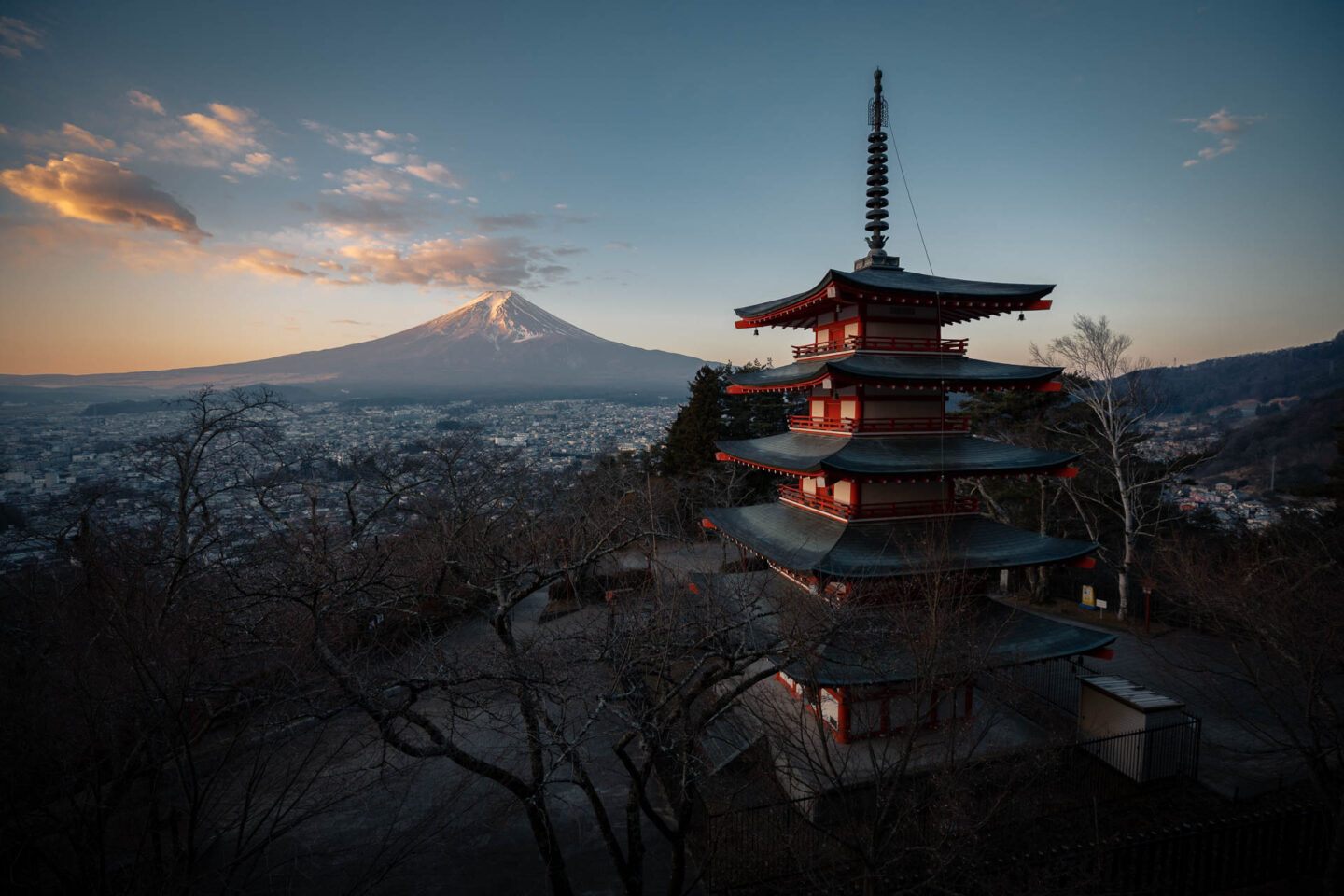
OVERVIEW – 7 DAY JAPAN ITINERARY
To get the most out of your 1 week in Japan, here is an overview of my recommended route to take:
- Day 1: Tokyo to Kyoto
- Day 2: Kyoto
- Day 3: Kyoto to Nara
- Day 4: Kyoto to Osaka
- Day 5: Osaka
- Day 6: Osaka to Hiroshima
- Day 7: Hiroshima to Fuji to Tokyo
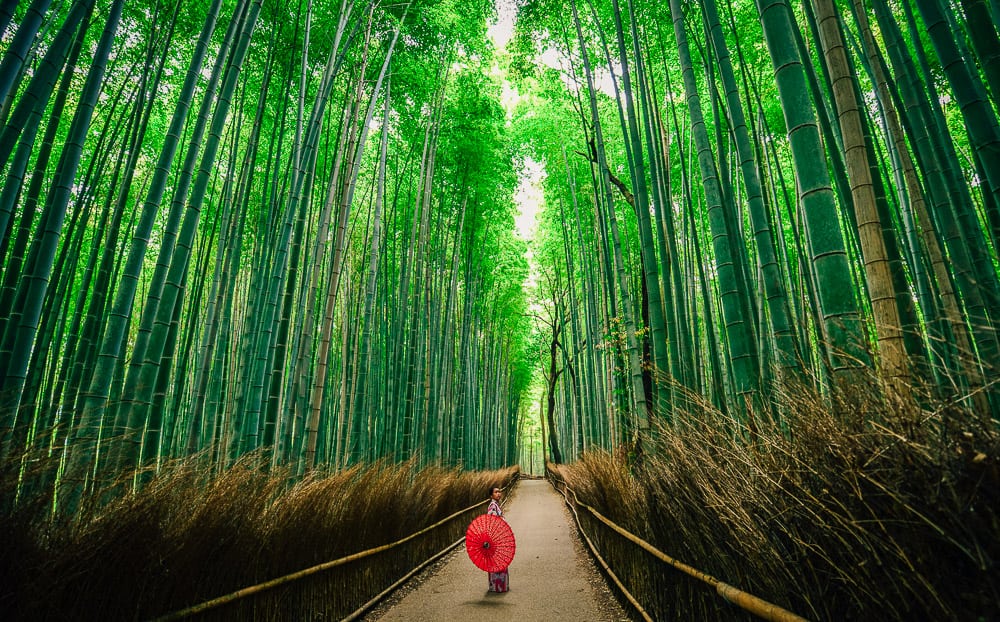
HOW TO GET AROUND – 7 DAYS IN JAPAN
The easiest and most convenient way to discover Japan is with a 7 Day Japan Rail Pass that is valid for use on the vast majority of railways and local buses operated by JR (Japan Rail) throughout the country.
Choose between an Ordinary Pass, or the Green Class Pass if you’re looking to travel in more comfort with reclining seats, a footrest, extra leg space, and a travel magazine.
The Japan Rail Pass is definitely the best ticket to have when planning your Japan itinerary 7 days budget!
Travel Japan with the JR Pass!
Get a 7-day, 14-day, or 21-day JR Pass for your trip to Japan and enjoy unlimited travel on JR services!
The JR Pass is valid on the Shinkansen (bullet train), Limited Express, Local Trains, and JR Buses.
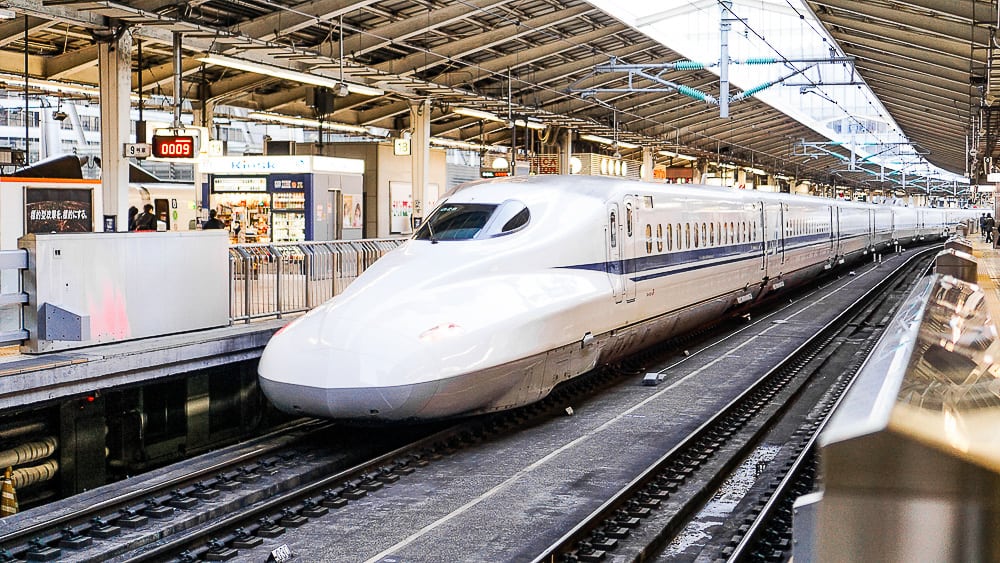
WHERE TO BUY YOUR JR PASS?
You can purchase a JR Pass online through an official Japan Rail Pass reseller such as Klook.
I recommend buying your pass prior to arriving – not only is it cheaper online than buying in Japan itself but it will allow you to jump right into your trip!
When you purchase your JR Pass, a voucher will be mailed to your home address within a couple of days (or delivered to your hotel in Japan, if you choose).
At the Travel Service Center, the process is very simple. You exchange this voucher and show your passport and visa.
(Note: When you land in Japan, you’ll automatically get a tourist visa in your passport at immigration. For the majority of nationalities, the visa is free if you’re in Japan for less than 90 days.)
Then, after specifying the date you’d like your pass to start and reserving your seat for the first leg of the trip, you’ll receive your pass and be ready to begin your 7 days in Japan!
Read More: JR Pass – A Complete Guide On How It Works
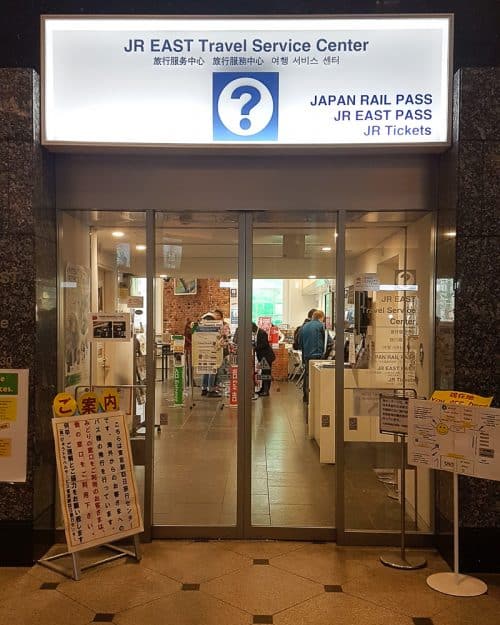
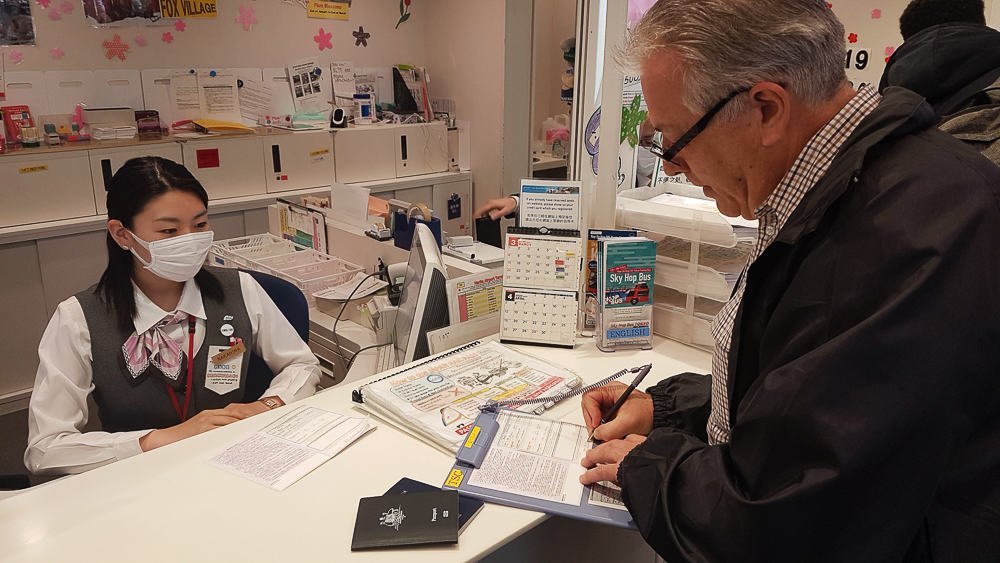
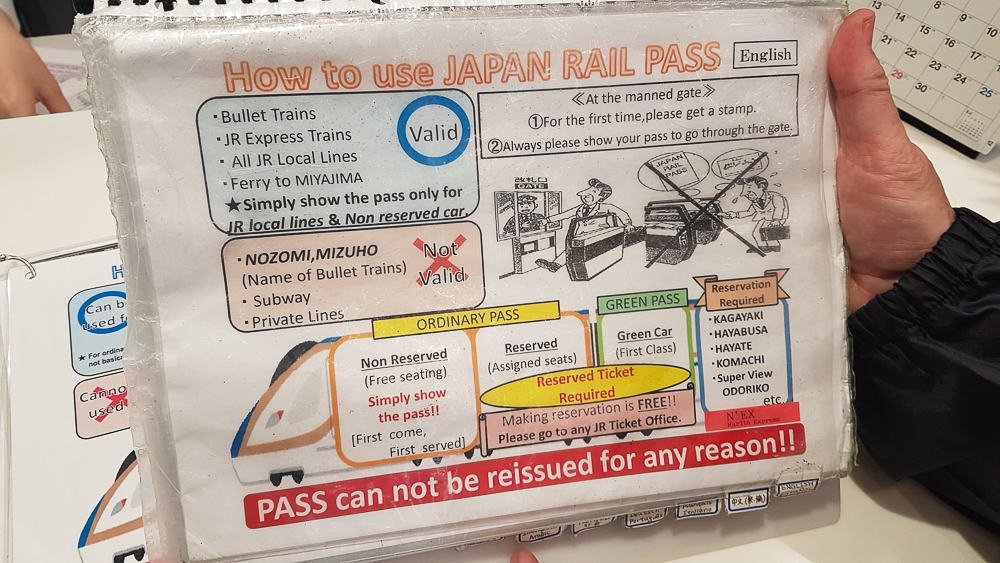
7 DAY JAPAN ITINERARY
Now that we’ve covered some logistics on how to get around Japan, let’s get to the fun stuff – a Japan day-to-day itinerary!
So, without further ado here is a complete 7 day itinerary for Japan!
DAY 1: TOKYO TO KYOTO
The first of your Japan itinerary for 7 days will be about getting from Tokyo to Kyoto, and that is pretty simple from Tokyo Station.
Note that, if you get to Tokyo late at night, I recommend staying near Tokyo Station so you’re ready to go early in the morning after.
HOW TO GET FROM TOKYO TO KYOTO
If you’re arriving at Narita Airport, I recommend getting the 1300¥ ($9 USD) bus direct from the airport to Tokyo Station.
It only takes around 70 minutes, and offers great views as you approach and become engulfed by Tokyo city!
Once you get to Tokyo Station, follow the signs to the Marunouchi North Gate exit, and there you’ll find the JR East Travel Service Center.
This is where you will trade your JR pass voucher for your actual JR Rail Pass.
From there, head to the JR Tokaido Shinkansen Line at Tokyo Station. Look for screens that show the name and departure time of your Shinkansen (this info is also on your reserved seat ticket), and you’ll be able to find the right platform and car number.
The trip to Kyoto takes about 3 hours on the bullet train, so if you leave in the early morning you can be there by around 11 am.
If the weather is clear, you might even sneak a view of Fuji on the way down, so keep a lookout on the right-hand side of the train!
In case you need to stay in Tokyo for the night, I recommend a hotel near Tokyo Station, and the one below is an excellent option.
The BEST Hotel in Tokyo
Need a place to stay? Hotel Metropolitan Tokyo Marunouchi is conveniently located near Tokyo Station.
Whether you’re here to explore the sights or relax in comfort, Hotel Metropolitan offers the best of both worlds.
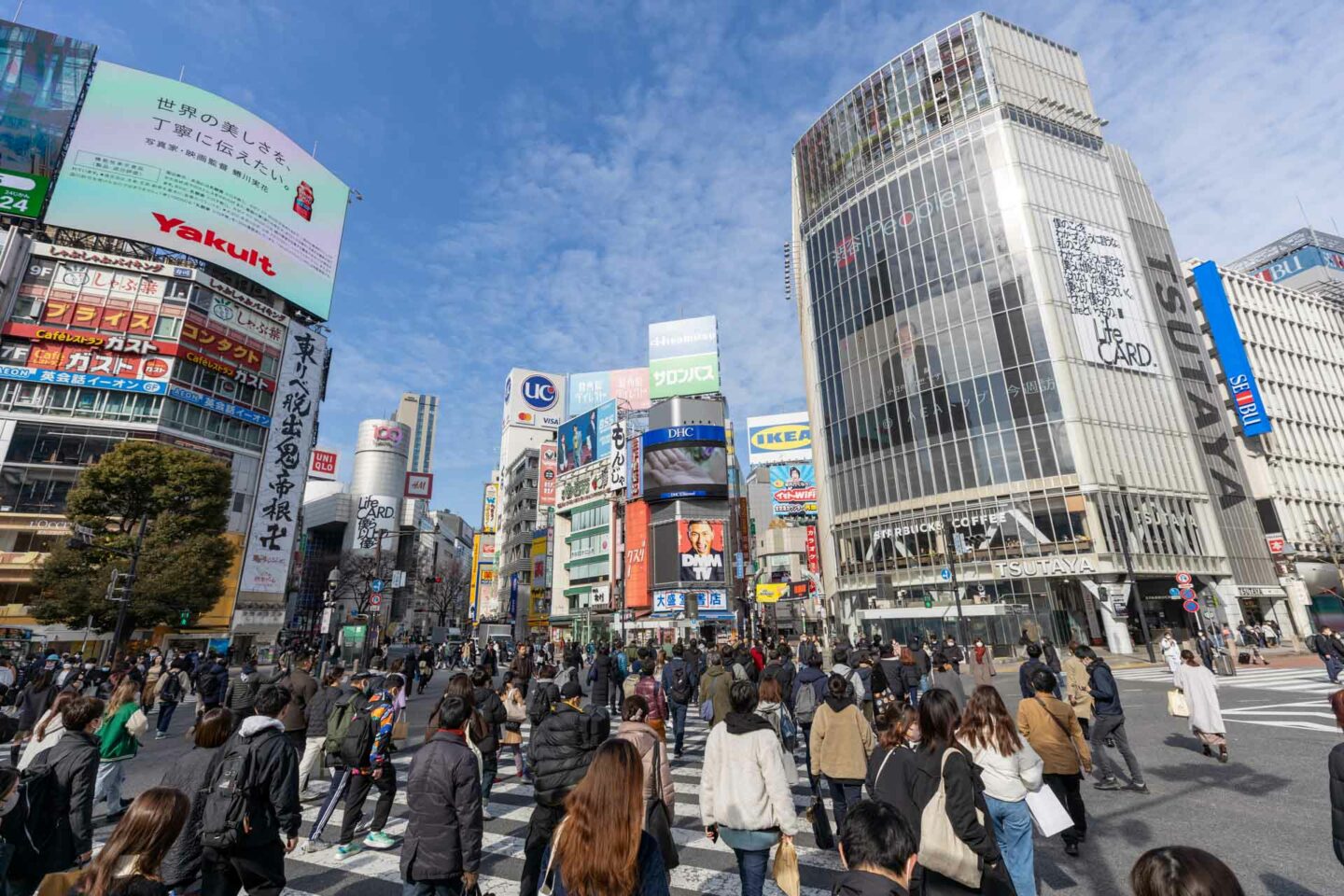
BEST THINGS TO DO IN KYOTO
The best tourist attractions you should check out when visiting Kyoto are the ones below.
Kyoto National Museum
For your first stop in Kyoto, I recommend briefly checking out the Kyoto National Museum.
With a wide range of exhibits showing off ancient Japanese culture and hosting many famous names in Japanese art, you’ll definitely be able to marvel at and learn something new about Kyoto’s rich history.
The entry price for adults is 700¥, and you can pay extra for exclusive seasonal exhibitions.
How to get there:
Kyoto City Bus 100 or 206 from Kyoto Station to Sanjusangendo-mae bus stop, or via a 10-minute walk from Shichijo Station on the Keihan line.
Kinkaku-ji Temple
Next on your 7 days itinerary in Japan, I highly suggest paying a visit to Kinkaku-ji Temple in Kyoto’s northwest, where you’ll find the famous Golden Pavilion, located on a small lake in the middle of a serene garden.
The building dates back to 1397, and was once the holiday retreat villa for a prominent Japanese Shogun!
You can expect to spend about an hour exploring the temple and its surrounding gardens. Opening hours are from 9 am – 5 pm and the ticket price is 500¥.
How to get there:
Kyoto City Bus 205 from Kyoto Station to Kinkakuji-michi bus stop, Kyoto City Bus 59 from Sanjo-Keihan to the Kinkakuji-mae stop, or taxi directly to Kinkaku-ji Temple.
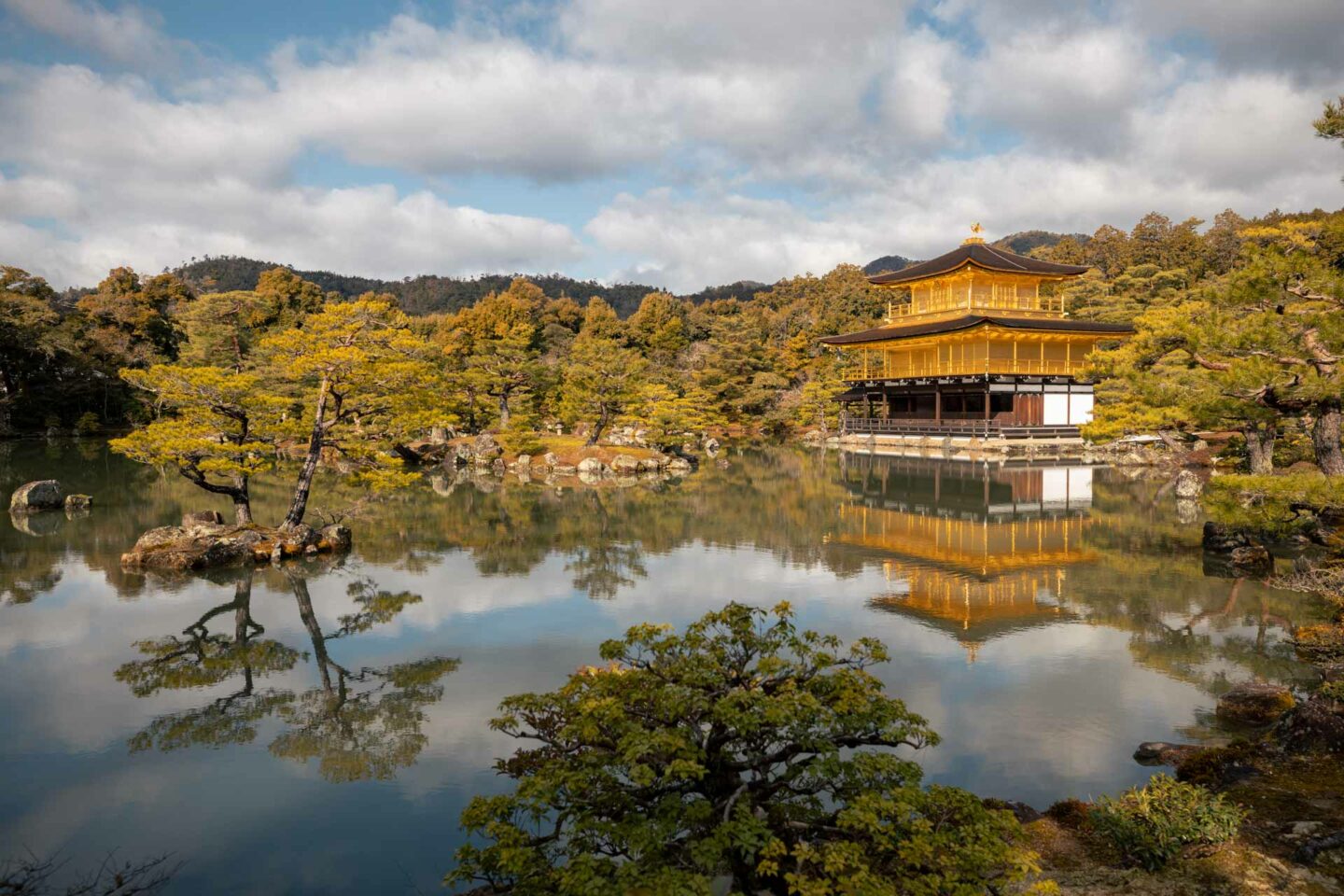
Ditch Your Backpack, Get a Suitcase!
The Nomatic Check-In is the only luggage you’ll need with 90L capacity for those extended trips.
It’s sleek, it’s durable, and it will save your shoulders from pain by not having to carry any weight.
Ryoan-ji Temple
Finally, from Kinkaku-ji temple it is a 20-minute walk or 5-minute bus ride to Ryoan-ji Temple – the site of Japan’s most famous rock garden, attracting hundreds of visitors every day.
Meditating with the view of this immaculately well-kept Cultural World Heritage site is a perfect way to end the first day of your itinerary!
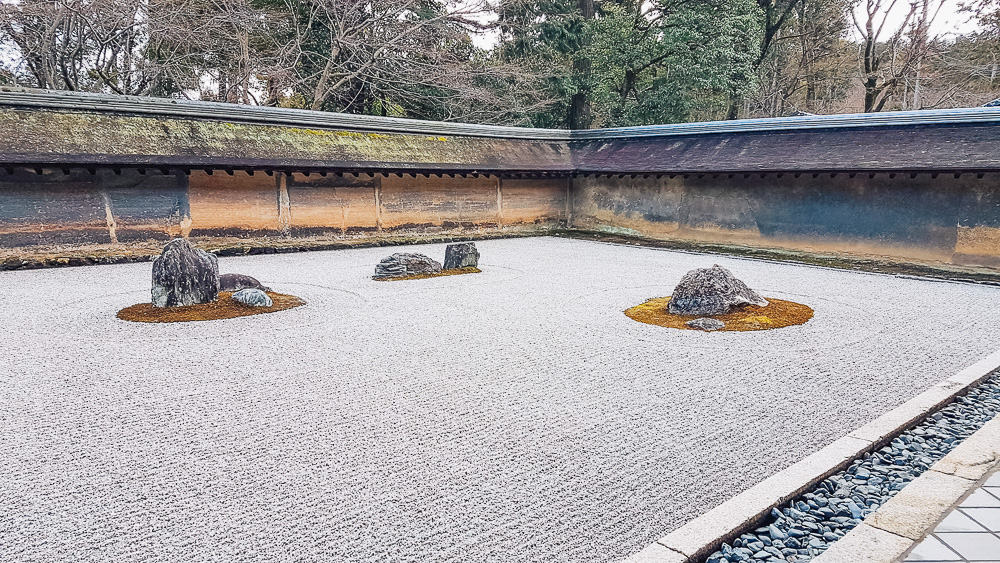
DAY 2: KYOTO
Day 2 is all about visiting other tourist spots in Kyoto, from the Arashiyama Bamboo Forest to the Tori gates of Fushimi Inari and more.
Arashiyama Bamboo Forest
Begin the second day of your 7 day itinerary Japan at the world-famous Arashiyama Bamboo Forest.
A trip to Japan wouldn’t be complete without having visited Arashiyama!
Kyoto’s bamboo forest is one of the most photographed attractions in the city and experiencing it through your own eyes is even better than any picture you would have seen of this place!
There is one main path leading through the Kyoto bamboo grove and when you enter the parallel tunnel of bamboo trees, you’ll feel like you’ve just entered another realm.
The nature that surrounds Arashiyama is absolutely breathtaking and chances are you’ll spot a few monkeys in the area too, so keep your eyes peeled.
A personal recommendation – make sure to come just after sunrise as photos will look even more stunning and you’ll avoid the group tours.
Talking about group tours, in case you don’t feel comfortable visiting by yourself, consider this Early Bird Tour that includes a visit to the Bamboo Forest.
The Arashiyama Bamboo Forest entrance fee is free of charge and the opening hours are Monday to Sunday from 5:30 am – 11:30 pm.
How to get there:
Find your way to Saga Arashiyama Station on the JR Sagano line using the JR Pass and it’s a short 10-minute walk from here.
BEST KYOTO BAMBOO FOREST TOUR
A must-do when visiting Kyoto is joining a Kyoto Early Bird Tour!
It includes a professional guide, a tour of the Bamboo Forest, and a visit to Kinkakuji Temple!
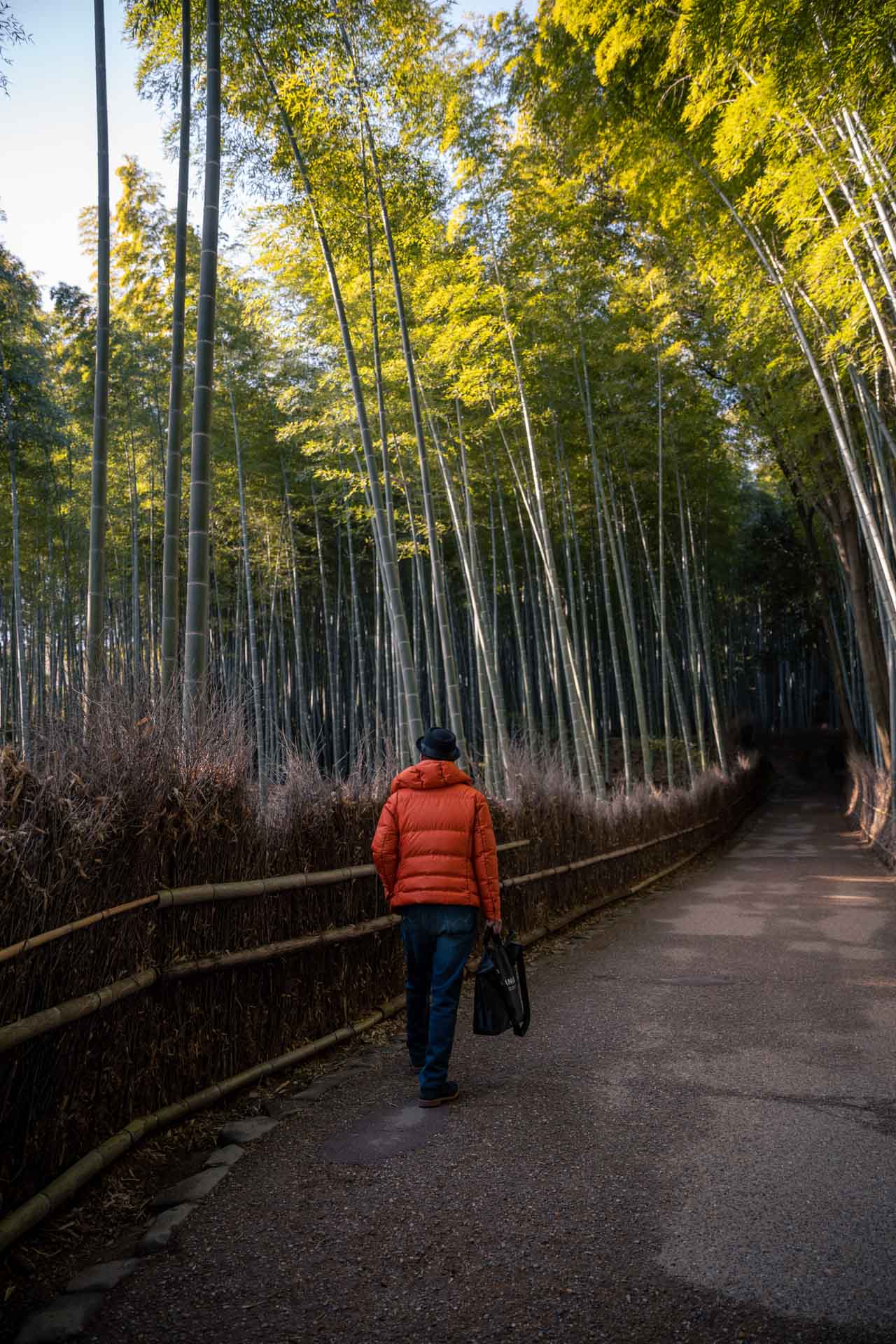
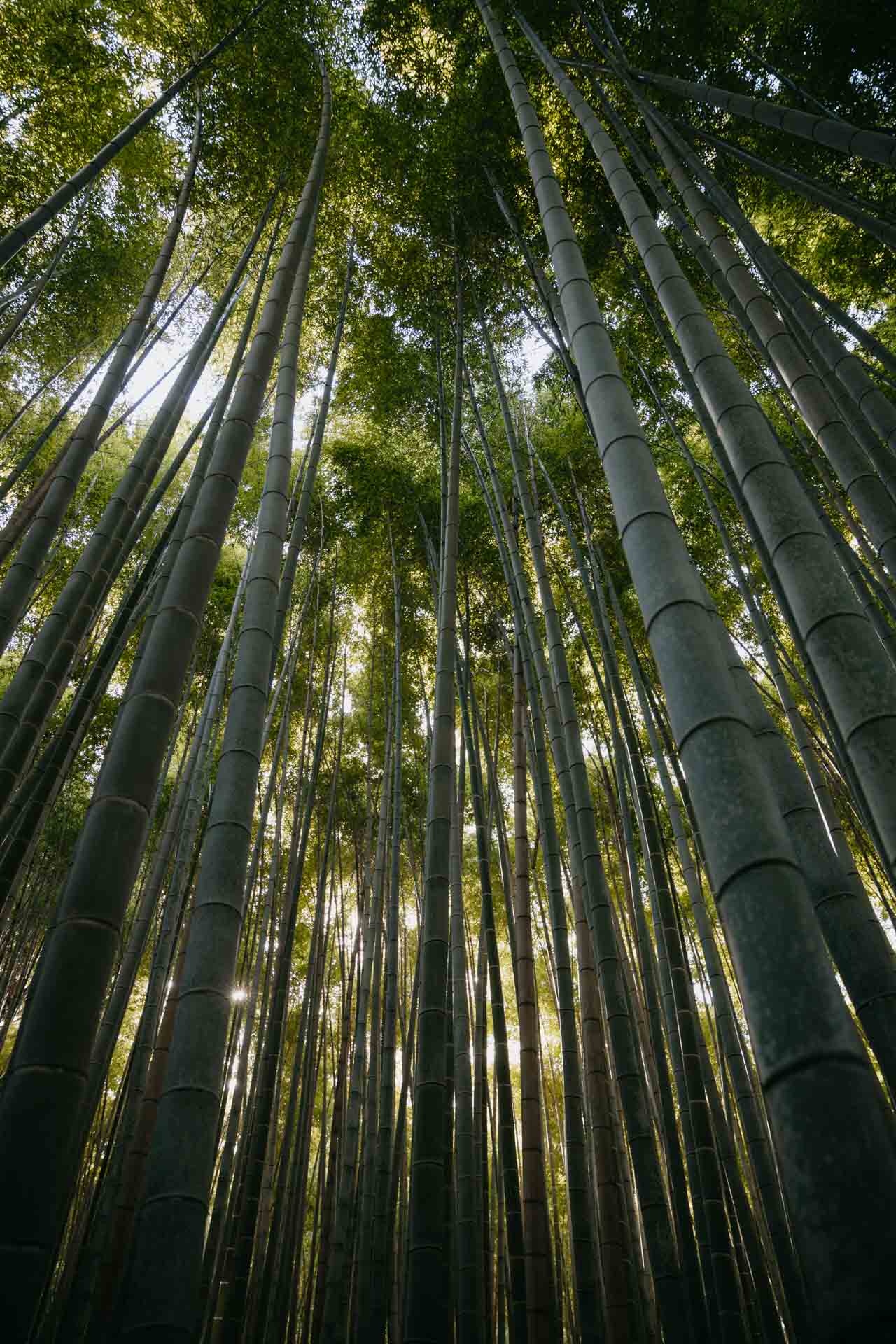
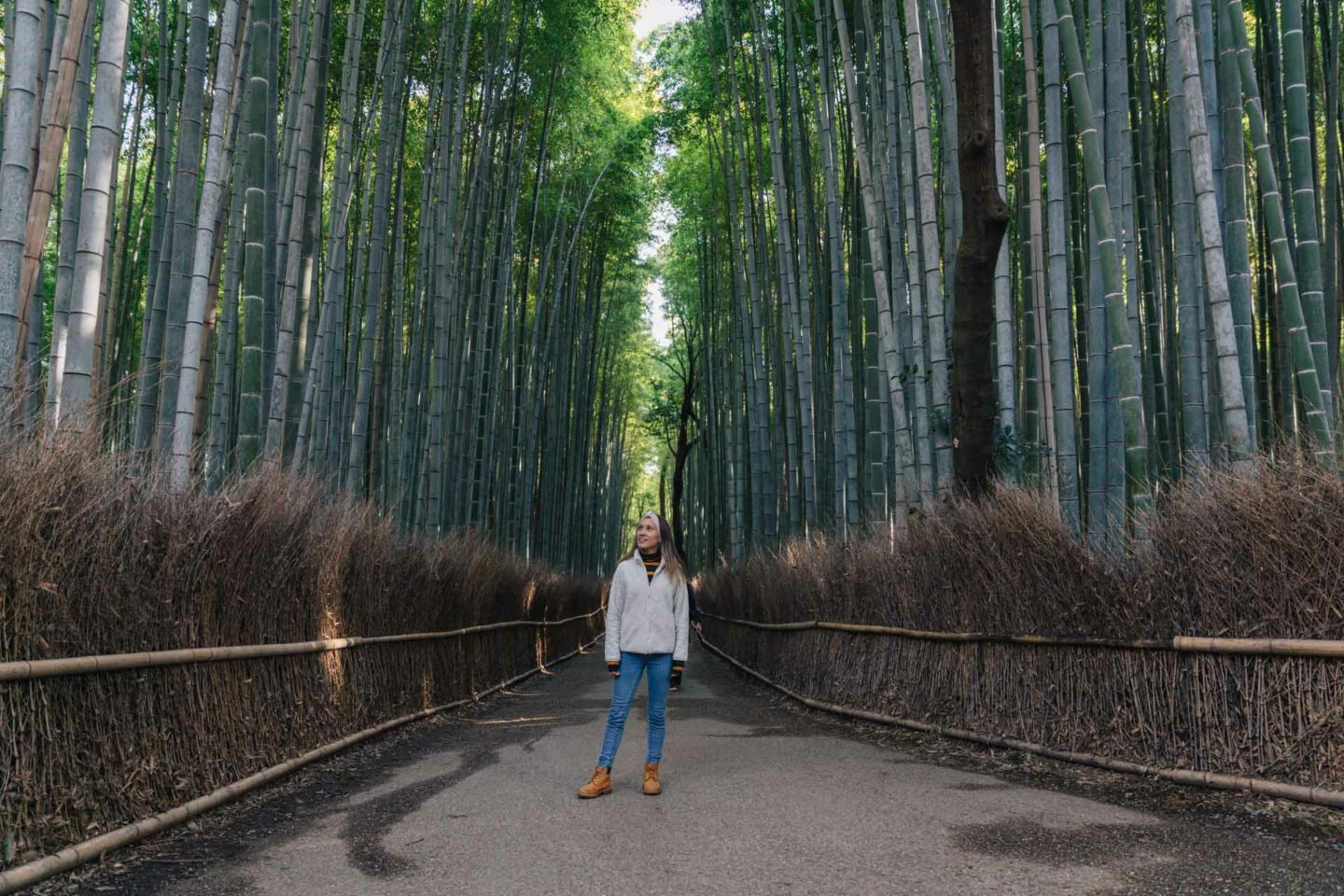
Fushimi Inari
Next up on this Japan itinerary is a journey through the world-famous Tori gates of Fushimi Inari.
This must-see shrine consists of a pathway lined with over 10,000 Tori gates that extend 4 km up to the very top of Mount Inari.
It takes about two hours to walk to the top and back down, however, you can turn back whenever you want!
Along the pathway, you will also see many stone foxes, symbolizing the messenger of Inari – the god of rice… and business!
The Fushimi Inari Shrine is free to enter and is open 24 hours a day, 7 days a week.
How to get there:
JR Nara Line from Kyoto railway station using the JR Pass, two stops to JR Inari station.
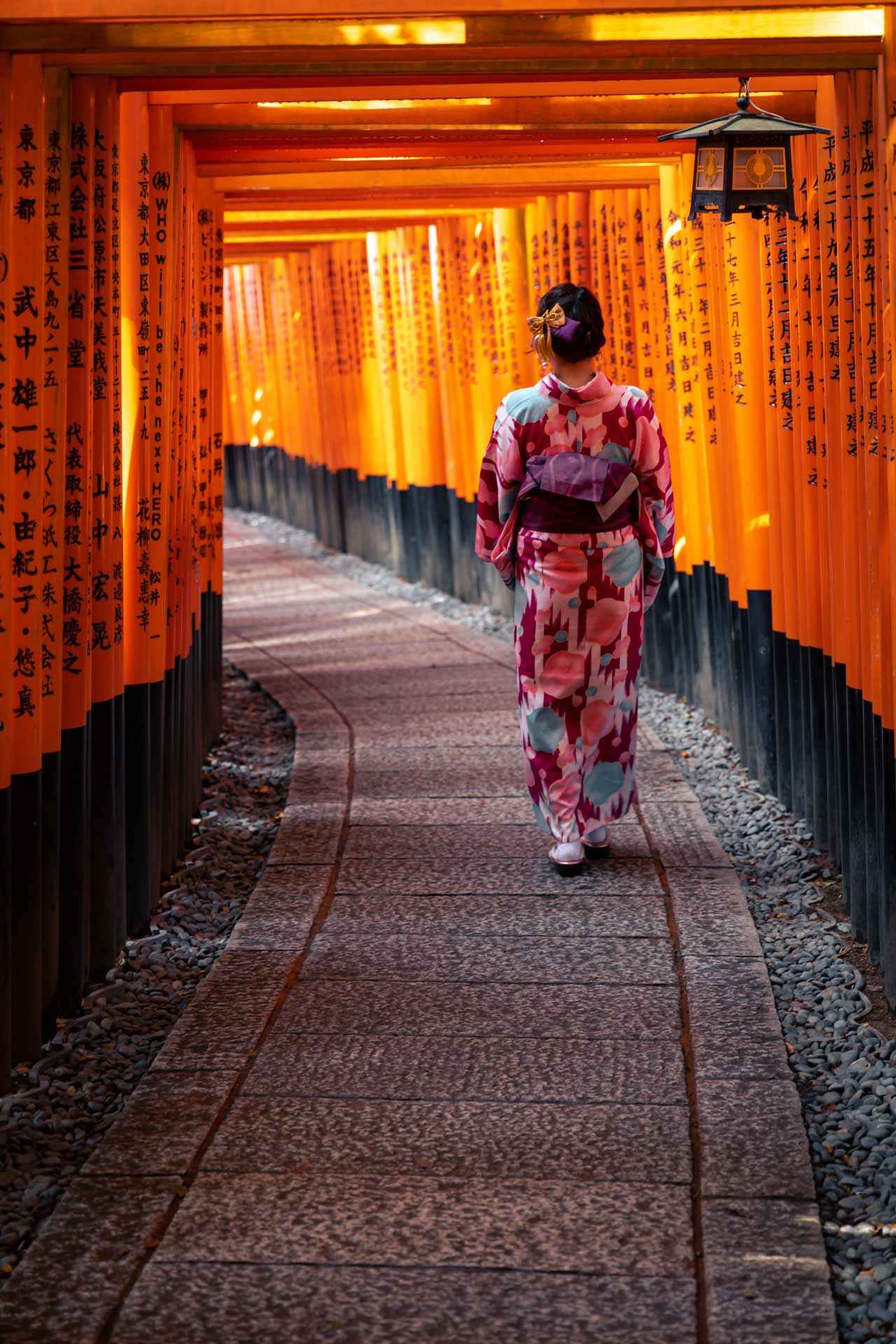
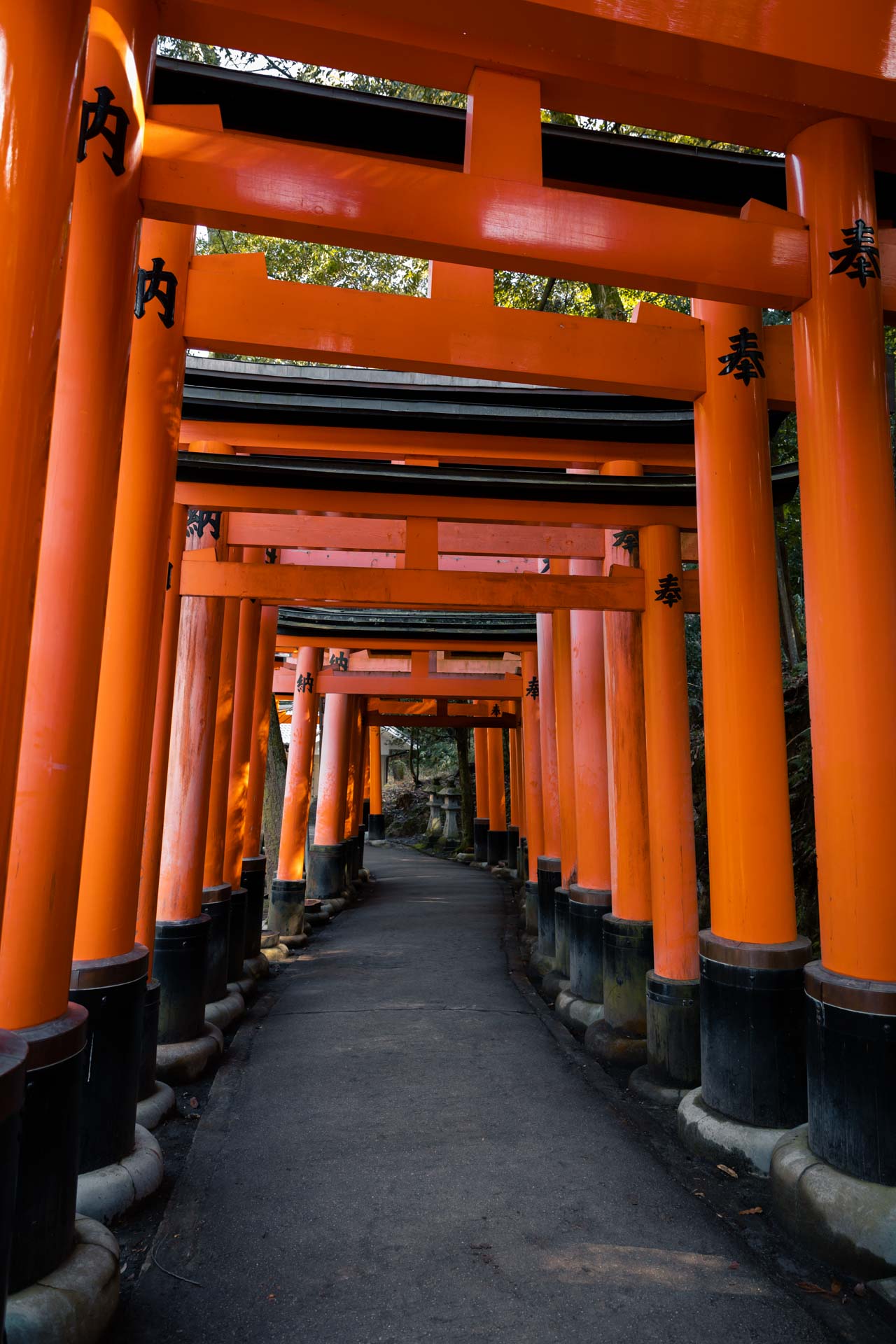
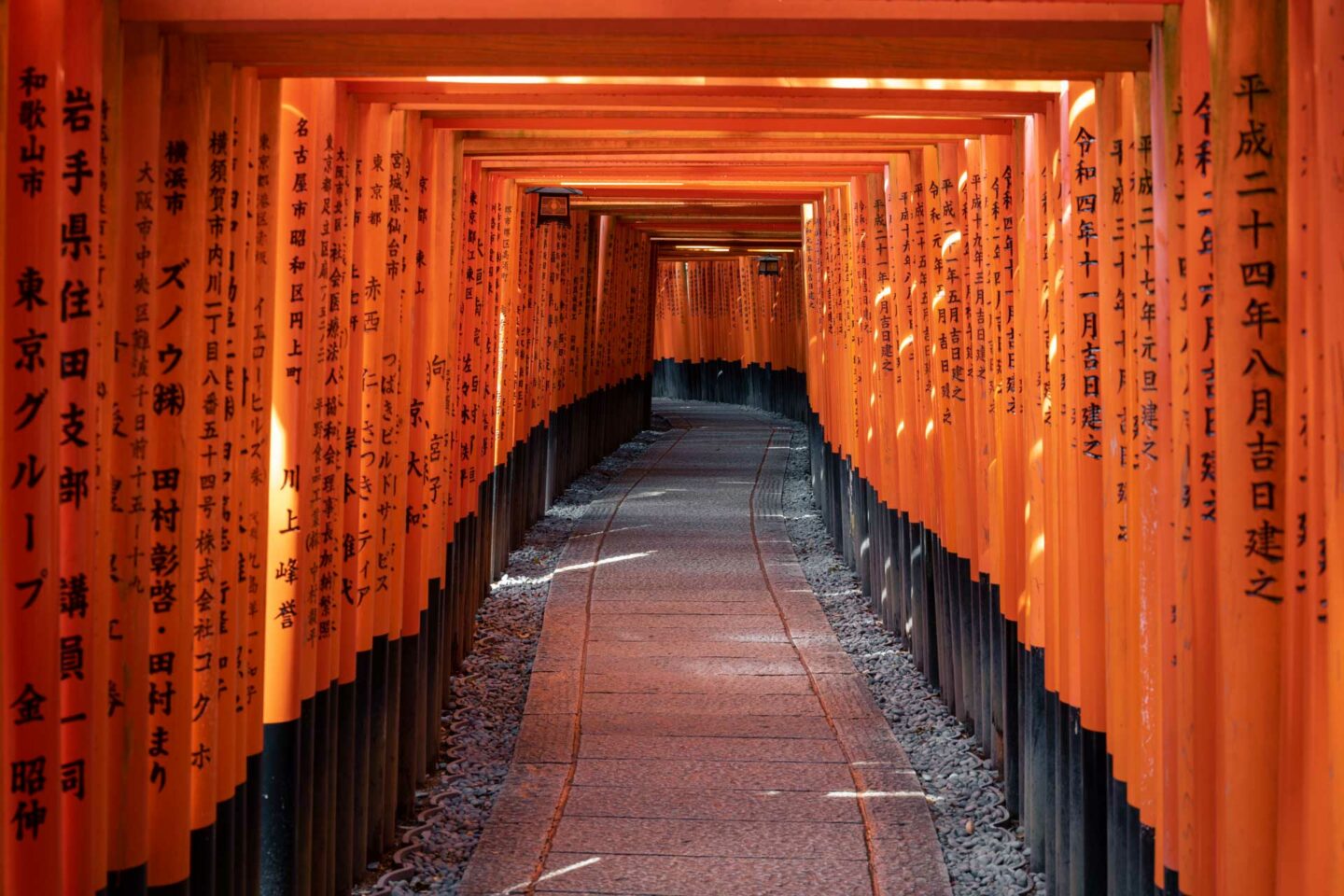
Maiko Theater
One of the most exclusive experiences in Kyoto is meeting a traditional Geisha performer.
Geisha are highly skilled entertainers who appear at high-end dinners, private parties, and special events to add a special touch to the proceedings and are rarely seen in public.
Many foreigners tend to run around the red light district areas to try to get a glimpse of a Geisha girl or pay large sums to have a private performance.
Luckily, for travelers on a budget, there are some cheap options to get a taste of what a Geisha show is like!
I personally recommend Maiko Theater. While training to become a Geisha between the ages of 15 and 20, these girls are known as ‘Maiko’, and this theatre gives you the rare opportunity to get to see one of them close up!
It is relatively inexpensive (5500¥ for their basic show, including a special dance and Q&A session), and you can take as many photos of (and with) her as you like!
How to get there:
Bus from Kyoto Station to Kawaramachi Gojo bus stop, then walk for 2 minutes, or 3 minutes walk east from Keihan Shimizu Gojo station (exit 4).
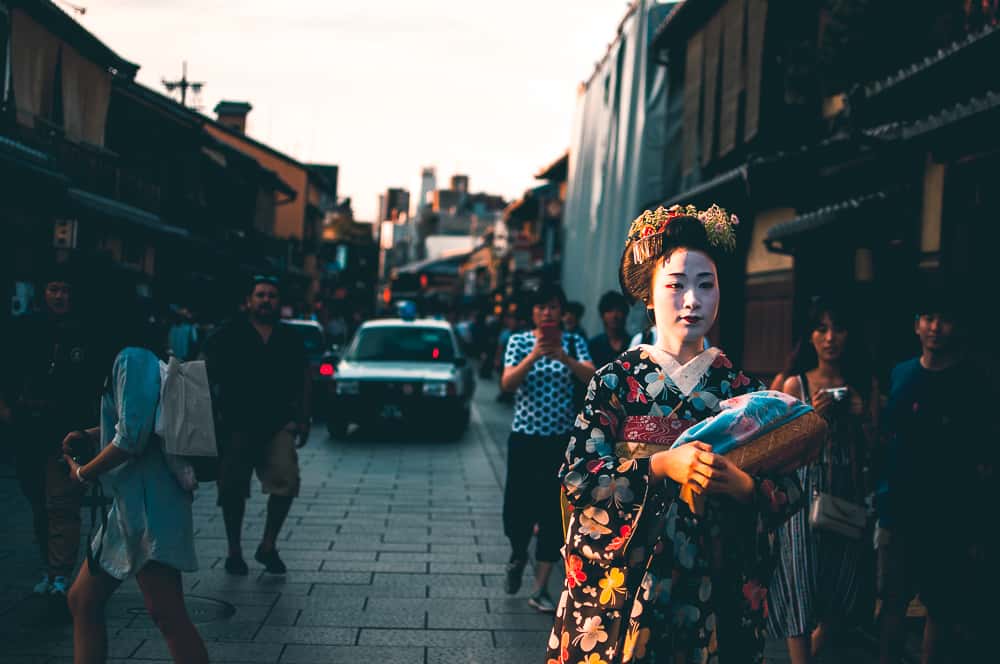
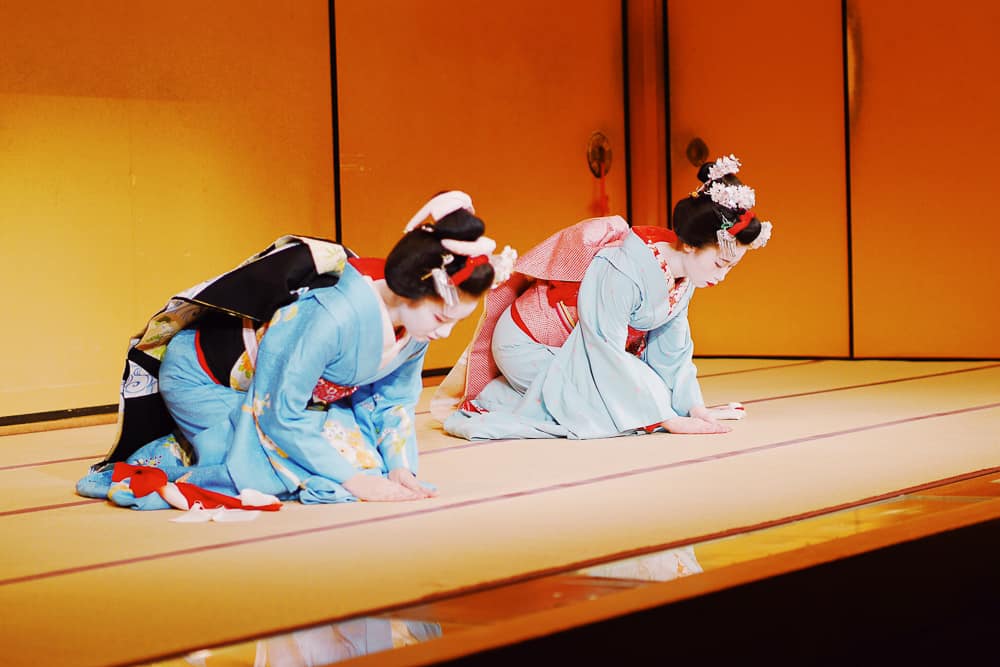
Kiyomizu-Dera
Next on this 7 days Japan itinerary, head to Kiyomizu-michi street and follow it uphill until you reach the popular Kiyomizu-dera (Water) Temple.
The walk leading up to the temple is almost as exciting as the temple visit, with many traditional buildings, shops, and restaurants.
The temple is built into the side of the mountain, and from the huge verandah, you can see spectacular views of the hillside and the entire city.
Below the Kiyomizu-Dera temple, you can find the reason why people make pilgrimages here from around Japan and the world – the Otowa Waterfall.
The waters are divided into three streams, and visitors use long poles with cups attached to drink from the streams.
Each stream has a different meaning and benefit – long life and health, success in school/career, and love. However, you can only drink from one… so choose carefully!
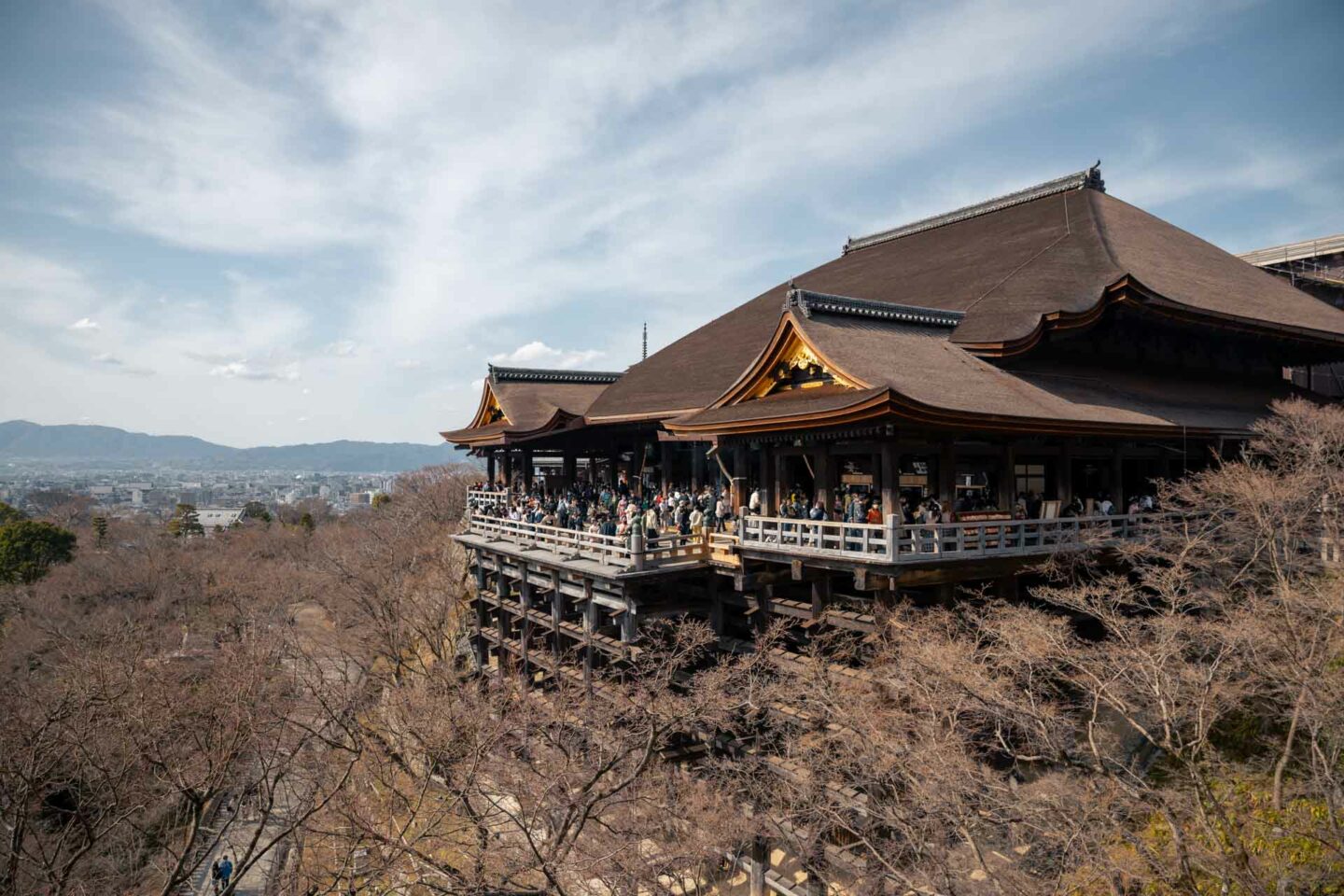
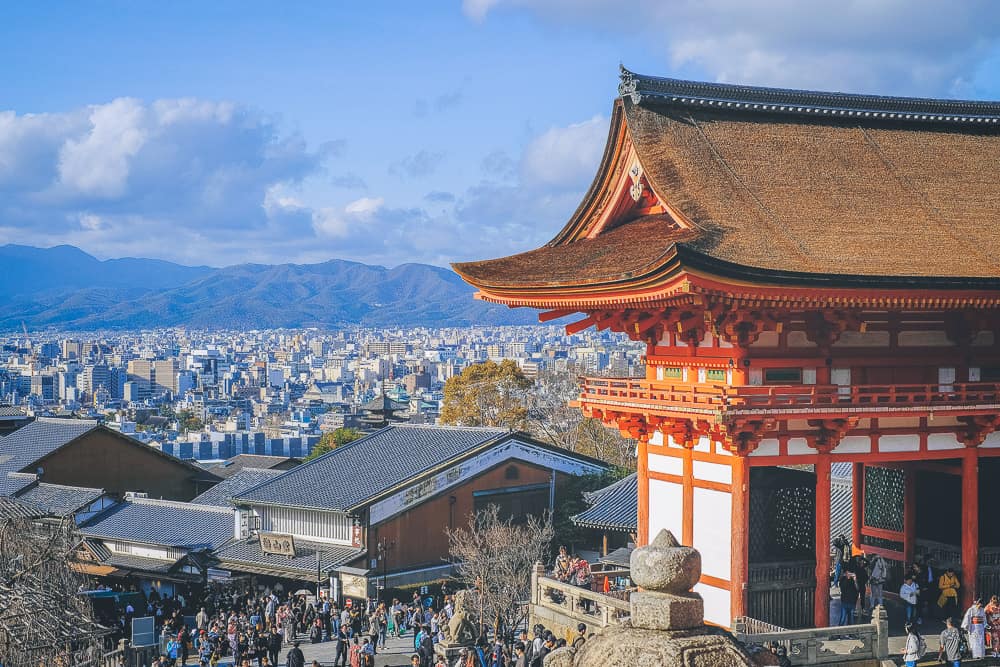
Gion
From Kiyomizu-dera, you can meander down the iconic Sannenzaka alleyway.
This historical, stone-paved street is lined with many traditional Japanese buildings, shops, cafes, and inns, and is also surrounded by several famous landmarks such as Yasaka Shrine, Maruyama Park, Yasaka Pagoda, and Kodaiji Zen Temple.
Once you reach the bottom of the hill, you’ve basically arrived at Gion, home to various red-light districts where you might be lucky enough to spot a Geisha! My favorite is Hanamikoji Street.
I recommend timing your arrival here for around 5:30 pm, as this is when the Geishas start leaving their homes to go to work (…and avoid the paparazzi of foreigners while doing so!)
Be careful though, you can be fined for taking photos of them, as it is considered highly disrespectful.
Put the cameras down for this one, and enjoy the chance to see one in the moment!
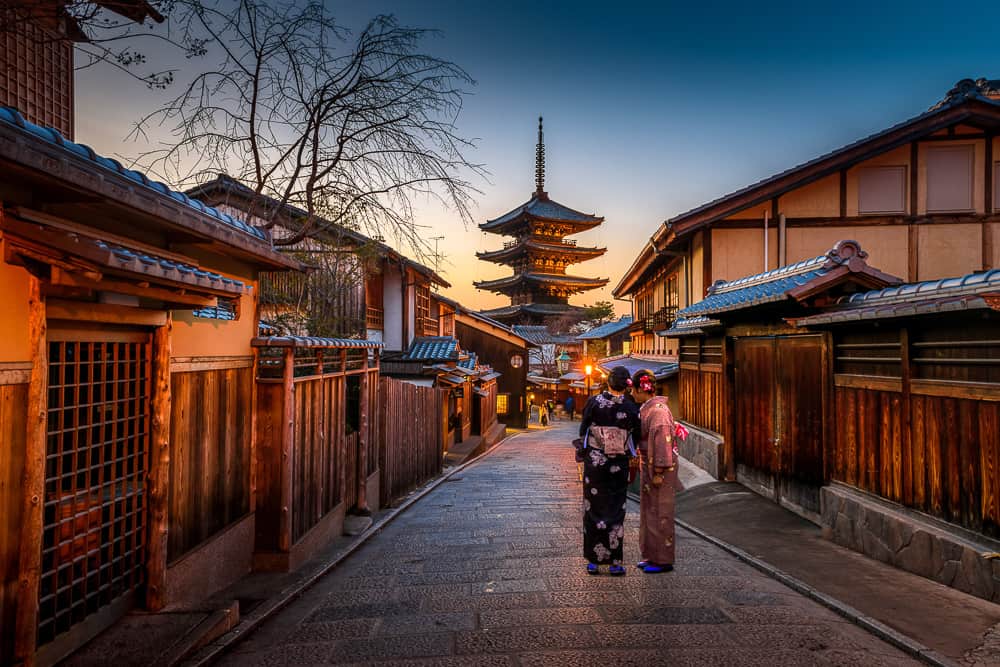
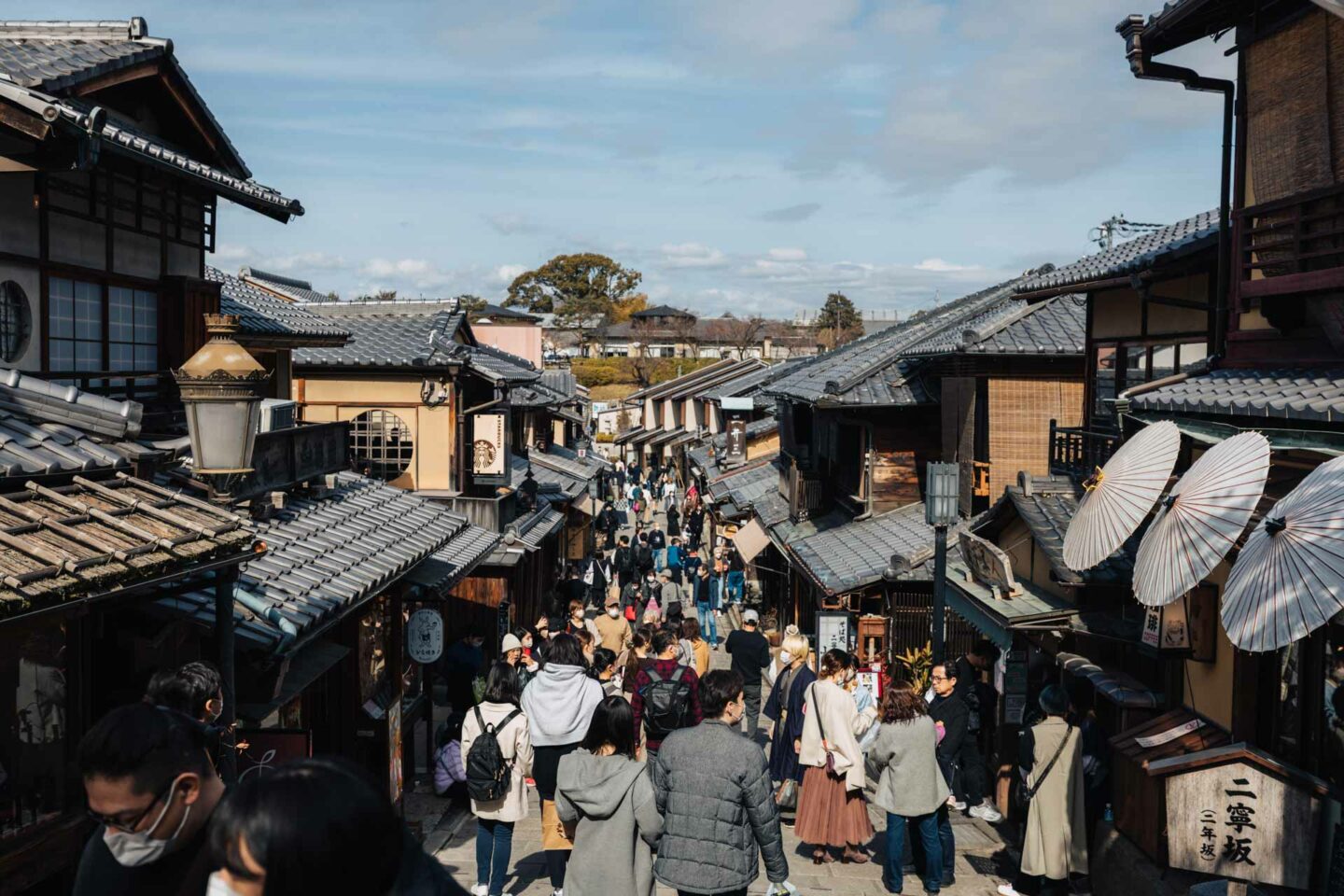
MORE THINGS TO DO IN KYOTO
If you want to see more attractions in Kyoto, be sure to check out my other travel guide which includes 25 AMAZING things to do in Kyoto!
Read More: Kyoto Travel Guide – 25 AMAZING Things To Do
WHERE TO STAY IN KYOTO
Kyoto has hundreds of accommodation options to choose from, so I have narrowed it down to a few of the best places to stay in Kyoto to suit the needs of luxury travelers, budget backpackers, and everyone in between.
See the list of accommodations below that I personally recommend in Kyoto for your 7 day itinerary Japan.
LUXURY: HOTEL GRANVIA KYOTO
MID RANGE: TUNE STAY KYOTO
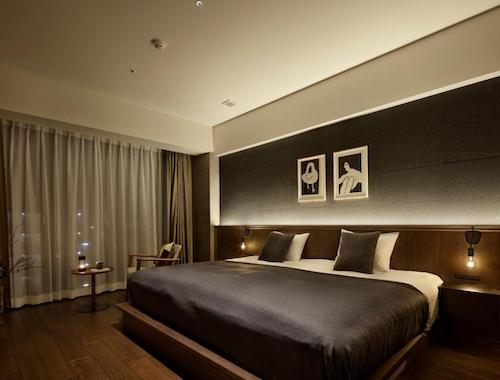
BUDGET: LEN KYOTO HOSTEL
TRADITIONAL RYOKAN
If you’re looking for an authentic experience to add to your Japan 7 day itinerary, I highly recommend staying at a traditional Ryokan (Japanese-style inn) during your stay.
My personal favorite is Kyoto Ryokan Kinoe which is conveniently located in central Kyoto just 5 minutes walk from Gion.
This cozy Ryokan offers spacious tatami mat rooms, 24-hour baths, and multi-course meals served for breakfast and dinner.
Staying here will make you feel like you’re a traveler back in Edo-era Japan!
For More Options In Kyoto, Search On Booking.com
DAY 3: KYOTO TO NARA
A day trip to Nara is an absolute must on your 7-day Japan itinerary and it’s best visited during your stay in Kyoto.
Once an ancient capital of Japan, Nara is home to some of the country’s most important cultural places, including the world’s largest wooden structure and the well-known Nara Deer Park.
HOW TO GET FROM KYOTO TO NARA
Using your JR Pass, take the JR Nara line from Kyoto Station to JR Nara Station. Local lines run about three times an hour, and the journey takes about 70 minutes.
BEST THINGS TO DO IN NARA
Below are some of the best things to do in Nara when visiting from Kyoto.
Todai-ji Temple
Todai-ji is the architectural highlight of this one-day Nara trip. Housing the world’s largest Daibutsu (bronze Buddha statue), this Great Buddha Hall is the world’s largest wooden structure.
As you approach Todai-ji, you can see the famous Nara deer chilling freely around the temple grounds.
It’s 800¥ to enter, and you can pay extra to visit the attached museum too.
How to get there:
Bus from JR Nara station to Todai-ji Daibutsuden station, then a 5-10 minute walk to the main temple.
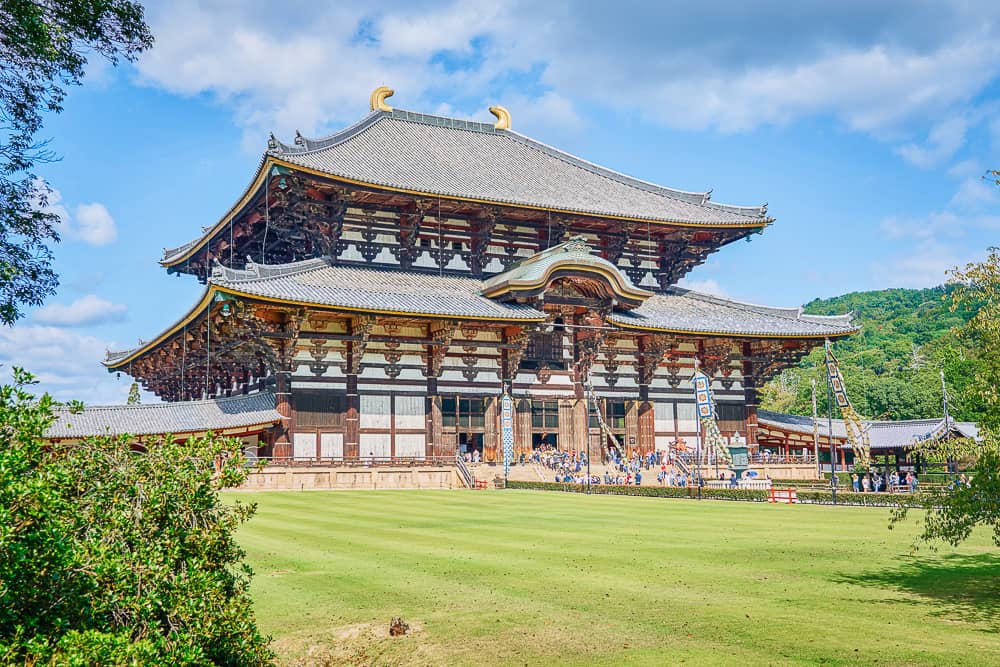
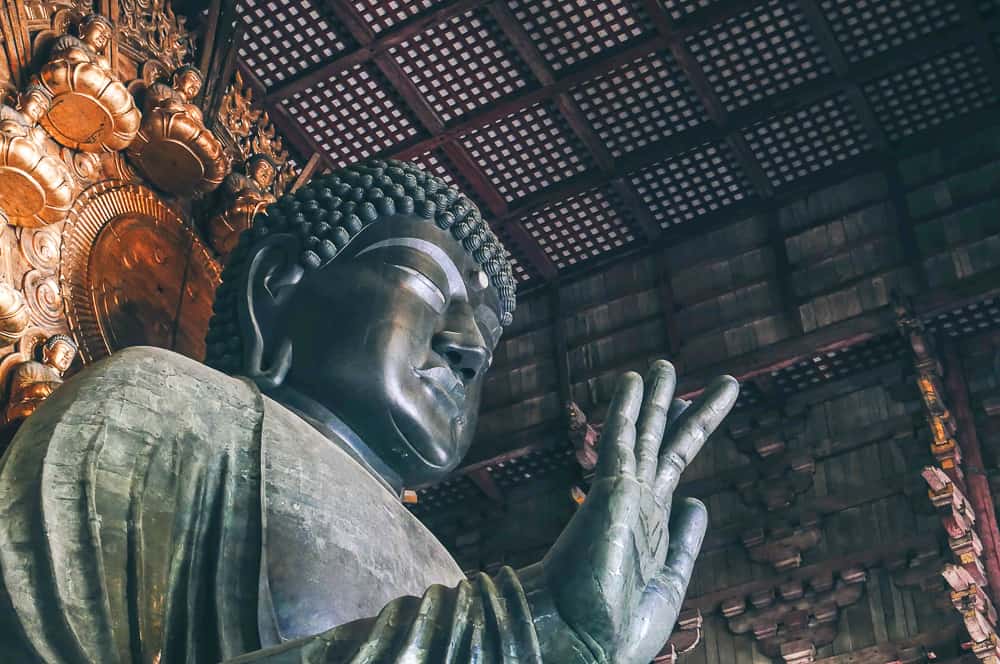
The BEST Affordable Camera For Travel
If you’re on the hunt for a professional camera for traveling, check out the Canon G7 X Mark II.
This tiny camera fits in your pocket, captures high-quality photos and videos, and has Wi-Fi so you can instantly transfer to your phone!
Nara Deer Park
From Todai-ji, it’s a short work to Nara Deer Park.
This place is full of the city’s iconic animal residents, and they aren’t afraid to say hello! You can even bow to them, and they will bow back!
You’ll see numerous street vendors selling senbei crackers that you can feed them.
But beware, as soon as a deer sees you holding one in your hand, it won’t stop following until it gets its cracker!
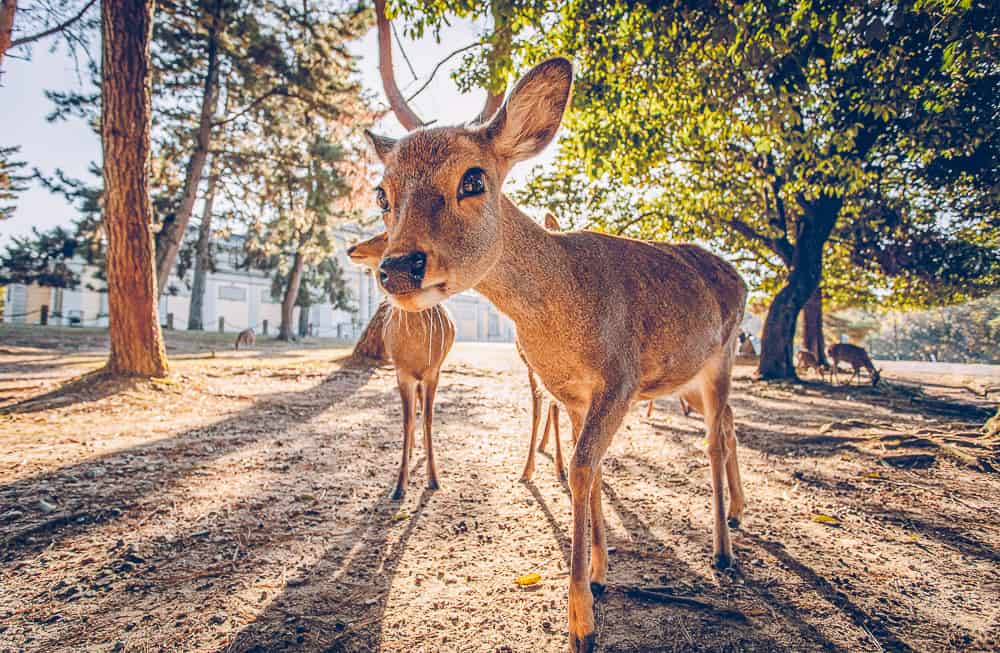
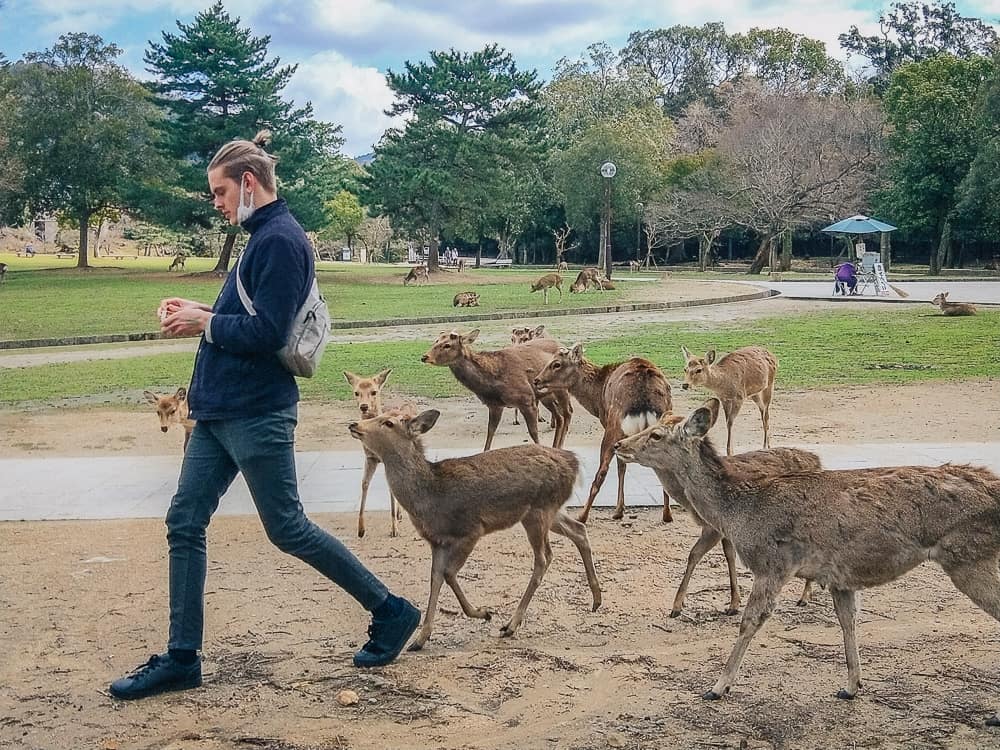
DAY 4: KYOTO TO OSAKA
Day 4 is all about Osaka, and you’ll easily get there from Kyoto. Let me elaborate below as well as some must-see attractions.
HOW TO GET FROM KYOTO TO OSAKA
The best way to get to Osaka station, once again using your JR Pass, is on the Special Rapid Service on the JR Kyoto Line.
The Special Rapid Train will get you to Osaka Station in 28 minutes. Trains depart from platforms 4 and 5 at Kyoto Station.
BEST THINGS TO DO IN OSAKA
Once in Osaka, you have to check out some of the best places in town, but first, head to America Town and Universal Studios after that.
Amerika-mura (America Town)
For your first stop on your Osaka itinerary, I seriously recommend spending time in Amerika-mura – an American-inspired district filled with vintage shops, record stores, and Western foods with a Japanese twist.
The now-thriving neighborhood was once filled with empty warehouses and parking lots, but all changed in 1969 when a hip cafe opened, attracting young people and artists from around the region.
Nowadays, it’s still a vibrant hub, and has some of the most eccentric and punk fashion anywhere in Japan!
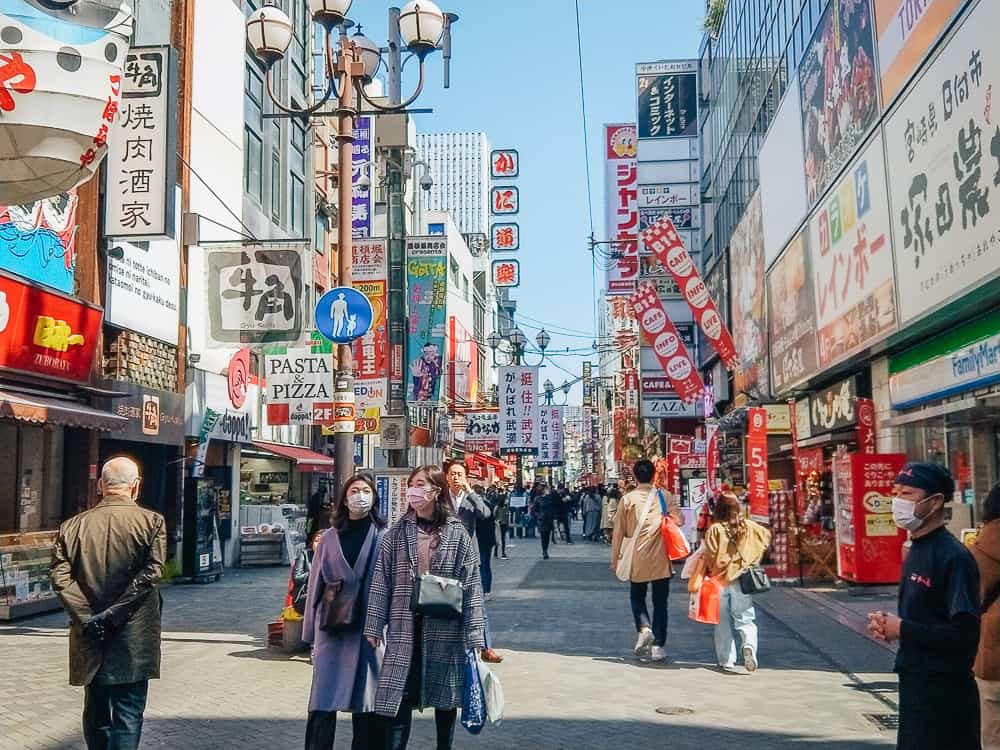
Universal Studios
If you’re into theme parks, then put Universal Studios Japan (USJ) on your 7 days in Japan itinerary!
This huge park is Osaka’s equivalent of Tokyo Disneyland and offers a world of pop culture, family-friendly rides, and an ever-changing calendar of seasonal events.
A 1-day studio pass starts at¥8,600.
How to get there:
From Osaka Station, you can take a direct train and be there in just 12 minutes!
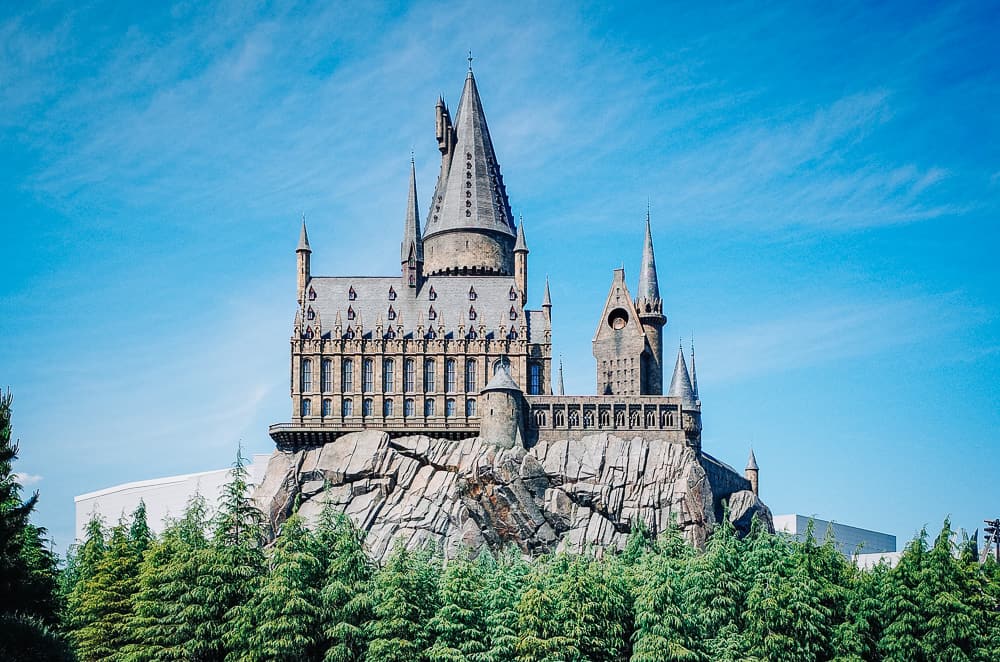
DAY 5: OSAKA
On your Japan itinerary, you’ll want to stay 2 days in Osaka, and after visiting Universal Studios on the first day, here are other attractions to see.
Osaka Castle
On the morning of day 5, I definitely recommend checking out Osaka Castle, one of Japan’s most recognized monuments.
Built by General Hideyoshi Toyotomi in 1583 as a display of power after unifying Japan, the castle grounds cover around 15 acres!
The surrounding park itself is also a famous spot for the Hanami (Cherry Blossom) season.
It’s definitely a worthwhile visit on any Japan itinerary! You will get to learn about not only this amazing monument but the incredible history of the region too.
Osaka Castle is open from 9 am to 5 pm every day and admission is 600¥.
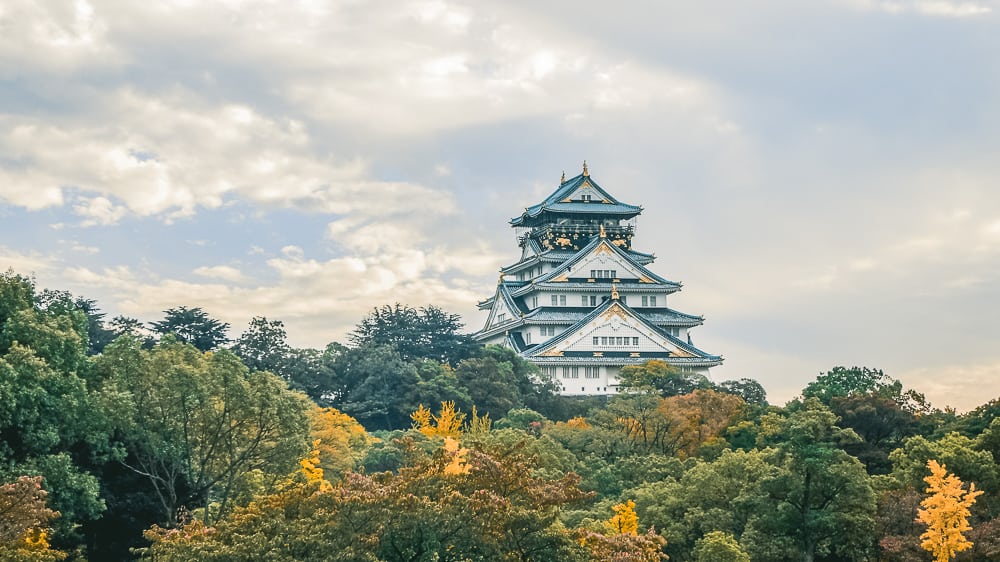
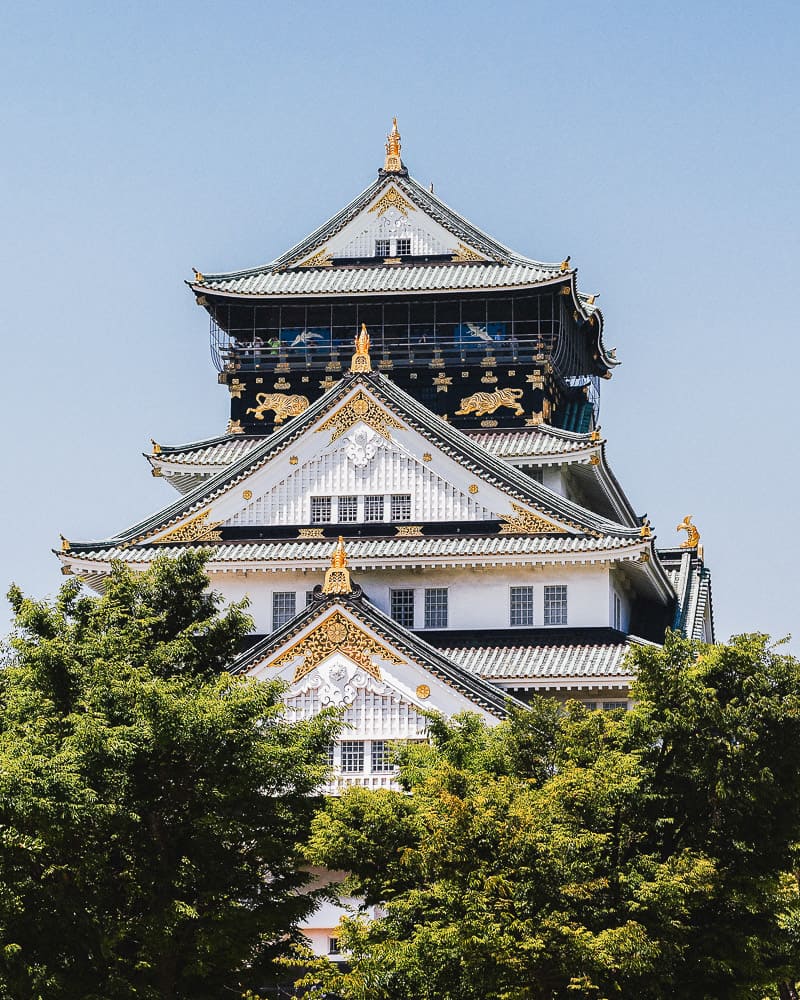
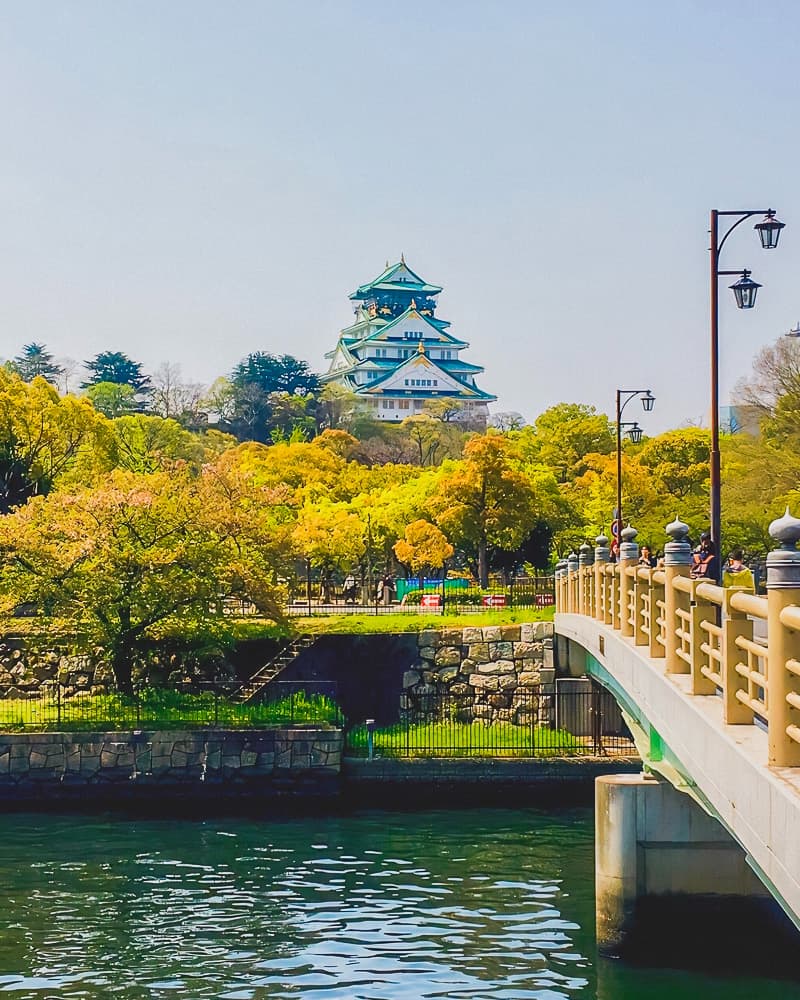
Dotonbori & Shinsaibashi
Located just a short 10-minute walk away from B&S Eco Cube, Dotonbori is affectionately known as the “Kitchen of Japan”, or the heart and soul of Osaka – famous for its dining, entertainment, and nightlife.
A trip to Osaka is never complete without visiting Dotonbori!
The food options at Dotonbori are endless. Be it street snacks, fast meals, or exquisite dining, there is always something to satisfy every palate.
Most of the restaurants are open till the wee hours, offering high-quality food that will never disappoint. Make sure to try Takoyaki (grilled octopus), the local specialty!
Shinsaibashi is the largest, oldest, and busiest shopping district in Osaka. Shinsaibashi-Suji is at the center of Shinsaibashi, a covered shopping arcade located north of Dotonbori and connected by the Ebisu bridge under the Glico running man billboard.
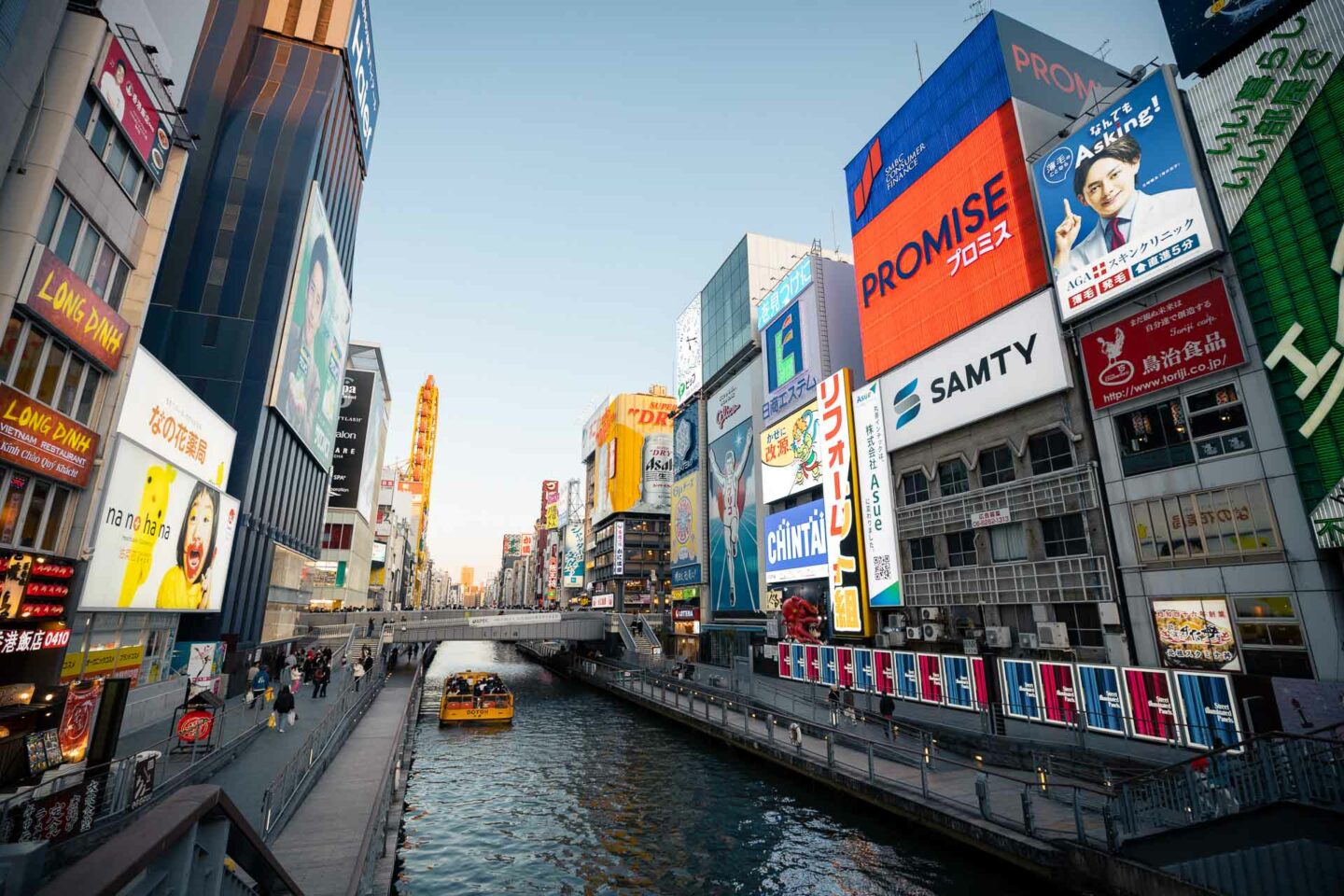
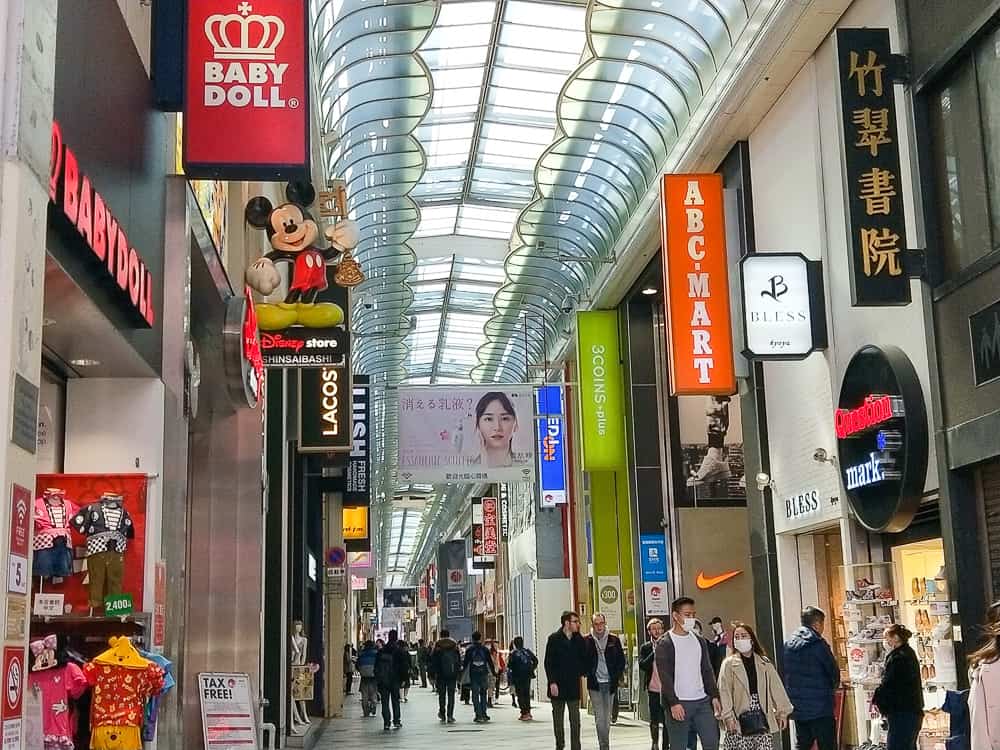
WHERE TO STAY IN OSAKA
Osaka has hundreds of accommodation options to choose from, so I have narrowed it down to a few of the best places to stay in Osaka to suit the needs of luxury travelers, budget backpackers, and everyone in between.
See the list of accommodations below that I personally recommend in Osaka for your Japan in 7 days itinerary.
LUXURY: OSAKA MARRIOTT MIYAKO HOTEL
MID RANGE: HOTEL ELCIENT OSAKA
BUDGET: IMANO OSAKA SHINSAIBASHI HOSTEL
For More Options In Osaka, Search On Booking.com
DAY 6: OSAKA TO HIROSHIMA
On the second last day of your Japan itinerary, the adventure continues from Osaka to Hiroshima.
Sadly, Hiroshima is best known as the location of the world’s first nuclear bombing.
Its most poignant sites are the Genbaku Atomic Dome, Hiroshima Peace Park, and Hiroshima Peace Memorial Museum.
I believe visiting Hiroshima and learning about its history should be a core part of anyone’s 7 day trip to Japan.
HOW TO GET FROM OSAKA TO HIROSHIMA
To get to Hiroshima, you need to first go to Shin-Osaka Station where the bullet train platforms are located, which is a short 3-minute train ride from Osaka Station via the JR Tokaido-Sanyo line.
From Shin-Osaka, you can take a bullet train on the Sanyo Shinkansen Line from Hiroshima Station, which takes 1 hour and 32 minutes on the Sakura, or 2 hours and 13 minutes on the Hikari.
THINGS TO DO IN HIROSHIMA
Hiroshima has endless things to do, especially on the historical side, and here are some of the best ones you should see.
Atomic Bomb Dome
The Atomic Bomb Dome is an impressive and somber sight.
Known before the bombing as the Prefectural Industrial Promotion Hall, it was one of the only buildings to survive the explosion and was preserved as a symbol of the bombing of Hiroshima.
Walking around this building can be a little bit eerie, and really makes you reflect on the destruction that war causes and how lucky we are to live in a mostly war-free world!
How to get there:
Tram from Hiroshima Station to Atomic Bomb Dome station, a flat rate of 180¥.
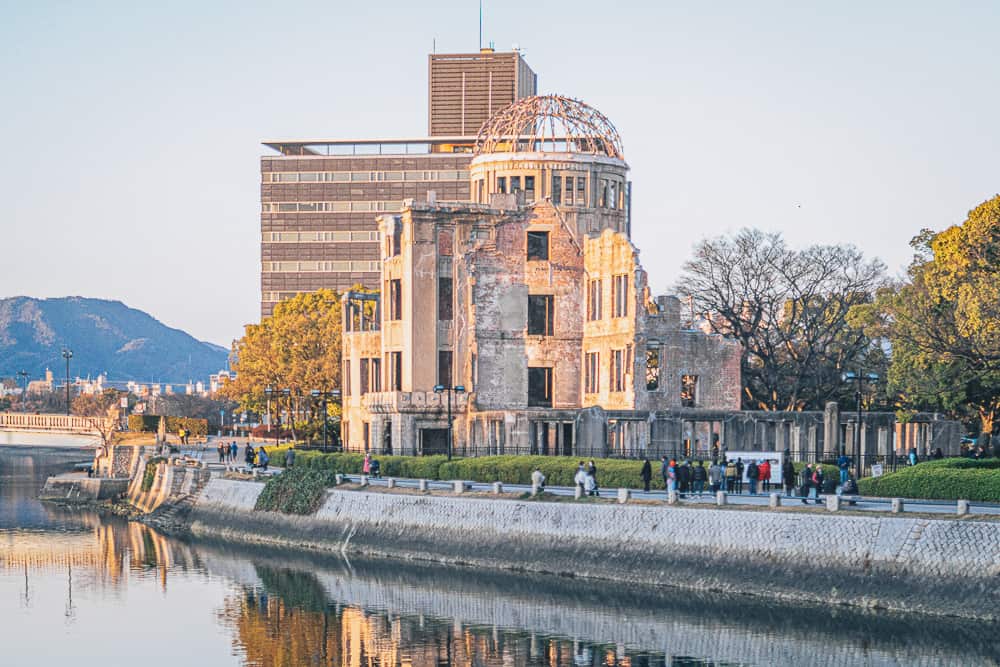
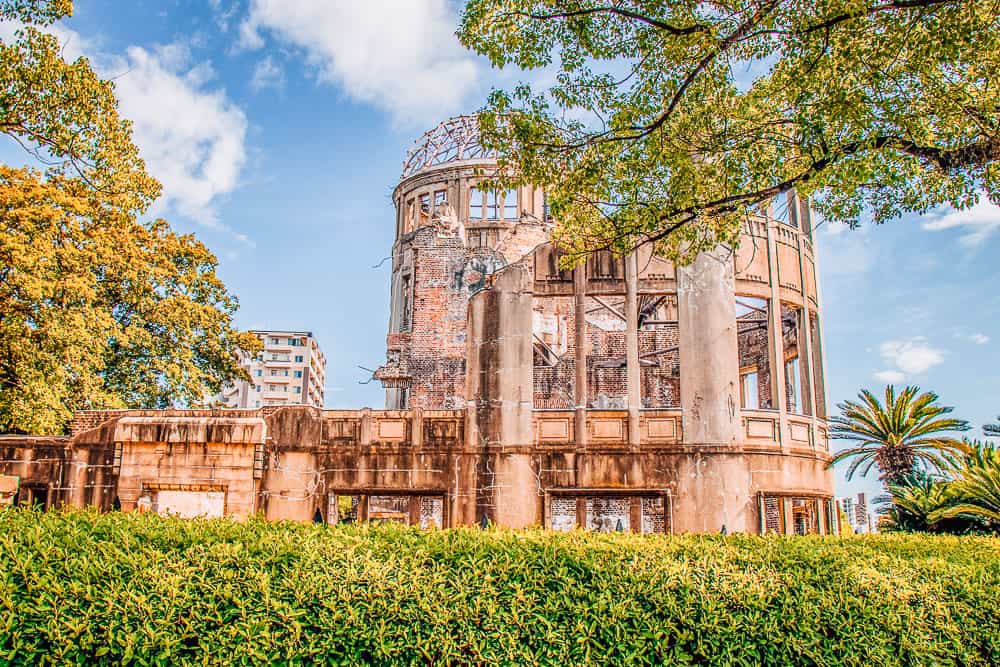
Peace Park & Hiroshima Museum
If you cross the river from the Atomic Bomb Dome, you enter the beautiful Peace Park. The key site here is the Cenotaph, which frames the ‘eternal flame’ of Hiroshima.
It is said that this flame will be burning until all nuclear bombs are eradicated. Unfortunately, I think that this flame is going to be burning for a long time!
The Atomic Bomb Dome, Peace Park, and Cenotaph are all free to visit and are simply must-see on your Japan tour itinerary 7 days.
For an entry price of 200¥, you can also visit the newly renovated Hiroshima Museum, which gives a very graphic and tragic historical account of the bombing and its lasting effects on Japan and the world.
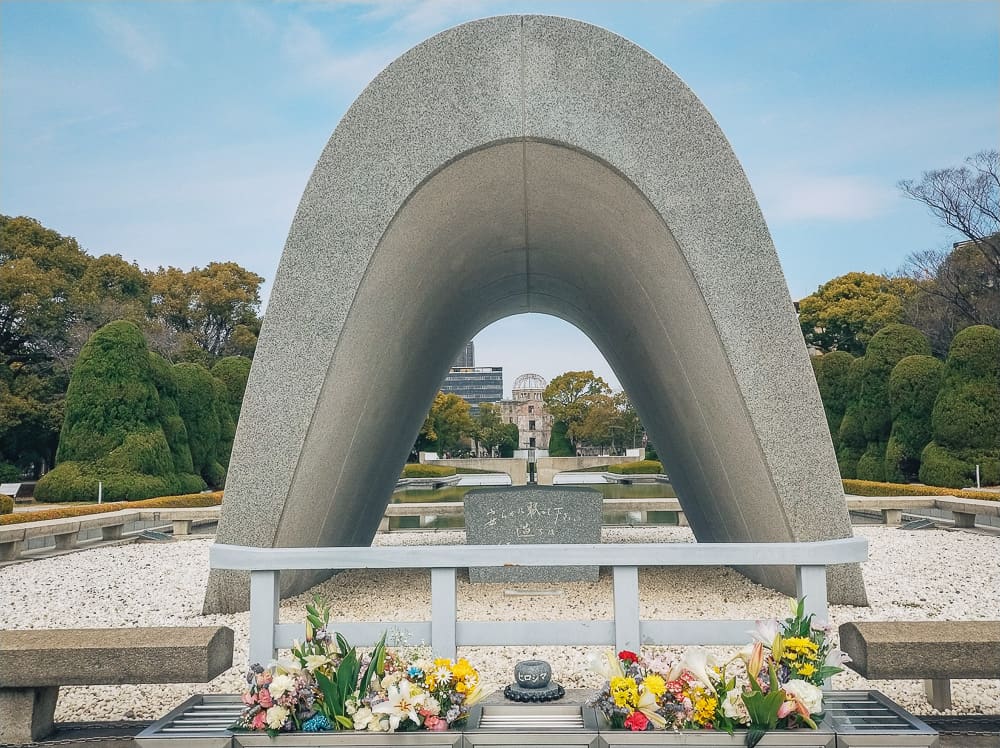
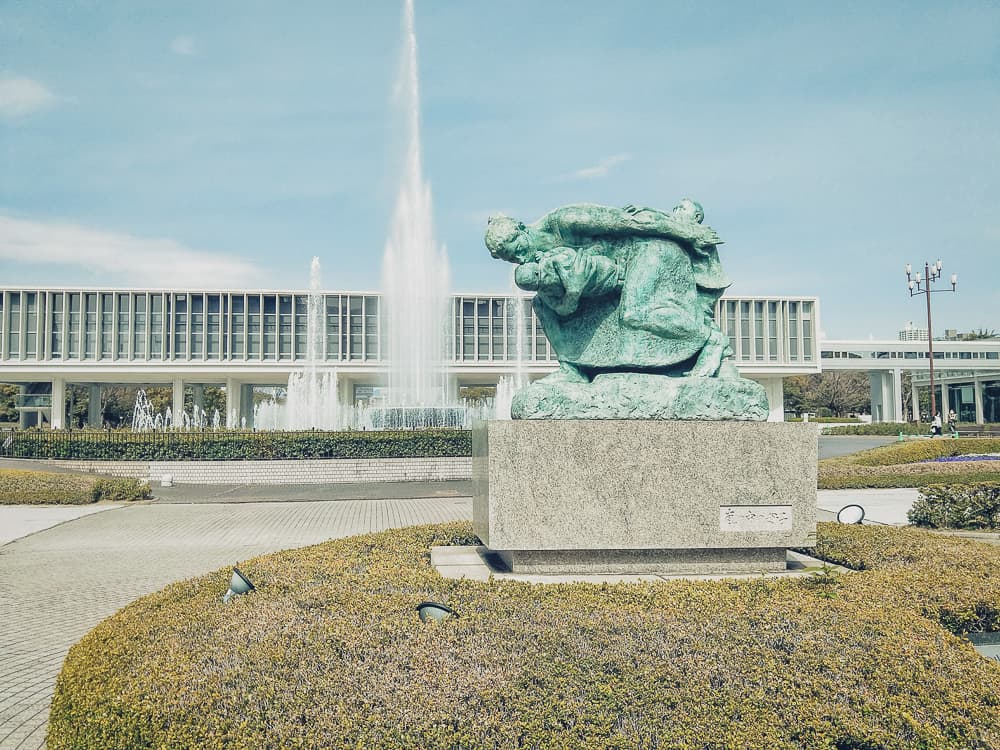
Miyajima Island
To finish off your day in Hiroshima, I recommend a visit to Miyajima Island.
Miyajima’s top attraction is the bright red shrine gate of Itsukushima-jinja which stands out in the sea and appears to be floating at high tide.
This spot is ranked as one of the three best views in Japan.
How to get there:
Trains depart from Hiroshima Station every 15 minutes for the 26-minute ride to Miyajimaguchi (JR Sanyo line), from where it is a 2-minute walk to the ferry bound for Miyajima.
You can ride on the JR Ferry for free with your JR Pass, it will take you 10 minutes to reach Miyajima.
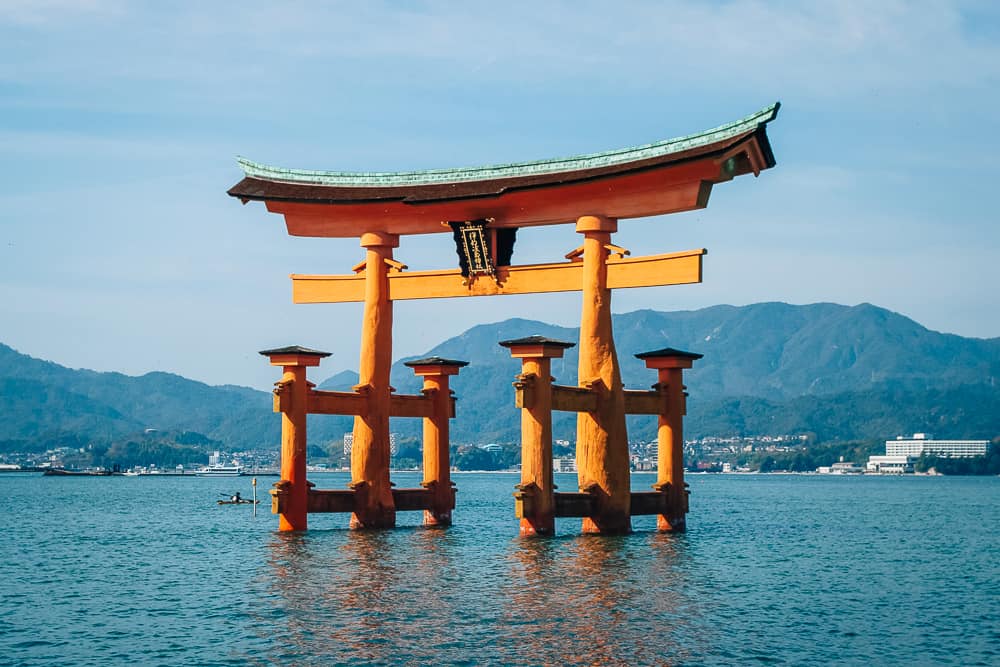
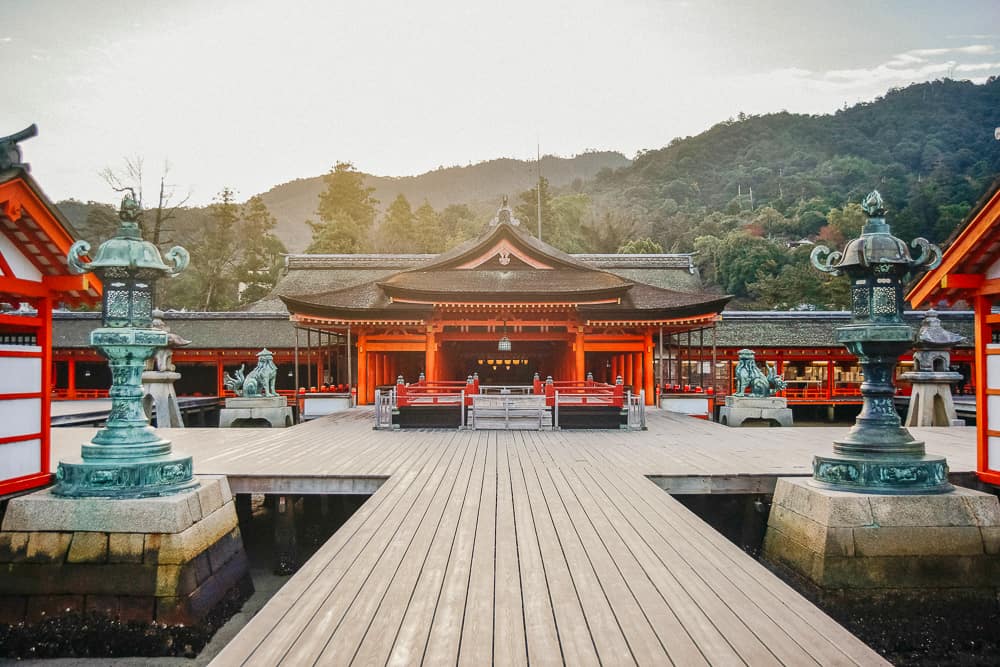
WHERE TO STAY IN HIROSHIMA
Hiroshima has hundreds of accommodation options to choose from, so I have narrowed it down to a few of the best places to stay in Hiroshima to suit the needs of luxury travelers, budget backpackers, and everyone in between.
See the list of accommodations below that I personally recommend in Hiroshima for your Japan in 7 days itinerary.
LUXURY: SHERATON GRAND HOTEL
MID RANGE: WE BASE HIROSHIMA
BUDGET: HOSTEL MALLIKA
For More Options In Hiroshima, Search On Booking.com
DAY 7: HIROSHIMA TO FUJI TO TOKYO
The last leg of this 7 day Japan itinerary is a little long but definitely worth it for the chance to see Mt. Fuji at the end!
HOW TO GET FROM HIROSHIMA TO FUJI
I highly advise you to wake up quite early on this last day!
From Hiroshima Station, get on the Sakura Shinkansen to Shin-Kobe, and then transfer to the Hikari Shinkansen and ride it all the way to Shin-Yokohama. You will arrive at around 12:40 pm.
From Shin-Yokohama, there are still a few more trains to catch.
First, you take the JR Yokohama Line Rapid until Hachioji, which takes around 40 minutes. From there, take the JR Chuo Special Rapid Service for Takao, which takes around 7 minutes.
Then, a 43-minute ride on the JR Chuo line until Otsuki station, where you can ride the Fuji View Express.
Fortunately, up until here, you can use your JR Pass, but as Fuji View Express is a private rail company, you can only get separate tickets or use your Suica card.
If you have any luggage, I recommend storing it at a locker at Takao station, as this is where you will come back to in order to return to Tokyo.
Locker prices are generally around 500-700¥ for a whole day, depending on if you are storing a backpack or suitcase.
Ride on the Fuji View Express until Shimoyoshida station. If all goes well, you should get in there by around 3:30 pm.
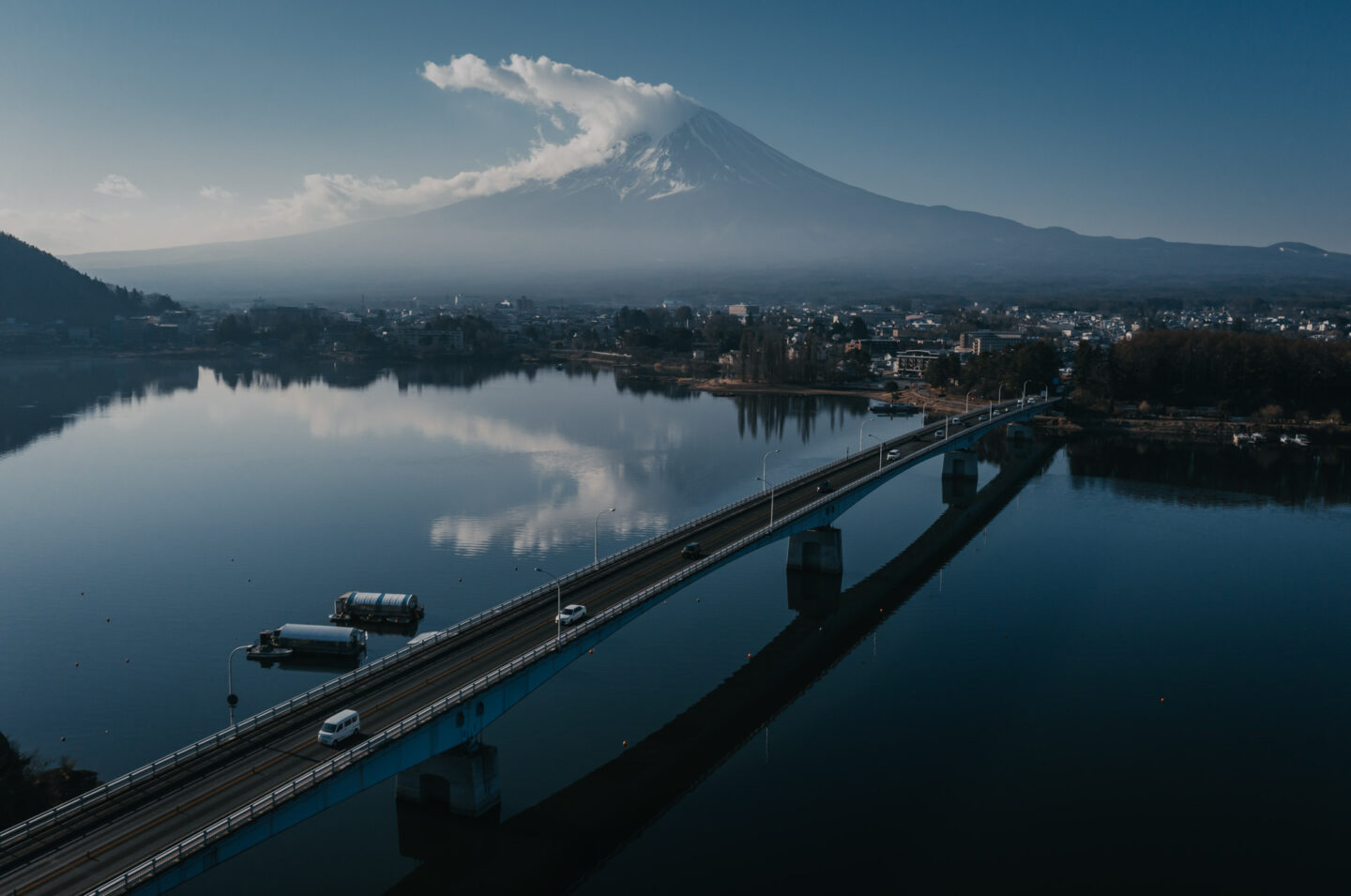
Take Your Photos & Videos To New Heights!
The DJI Mini 3 Pro is the most affordable, user-friendly drone camera suitable for all levels!
This travel-sized drone captures 4K/60fps video, 48MP photo, and has 34 minutes flight time.
Chureito Pagoda
From Shimoyoshida, you have a 20-minute walk up to the Chureito Pagoda.
The Chureito Pagoda, also called the Chastain Tower and officially named the Fujiyoshida Cenotaph Monument, is a shrine located in the Fuji Five Lakes region at Mount Fuji’s northern base.
Chureito Pagoda has five stories; it is situated on a mountainside overlooking Fuji Yoshida City, with Mount Fuji itself visible in the distance.
This is one of the absolute best locations to get a shot of Fuji if she’s not being shy and hiding behind the clouds!
The locals say that the best time to visit for a full view is in the cold months of January and February, as that is when it is least cloudy.
The Chureito Pagoda is free to enter and it’s open 24 hours a day, so you can even stay to watch the sunset over this breathtaking mountain (depending on the time of year!)
I think it’s safe to say that Chureito Pagoda is an incredible sight to witness at the end of your 7 days in Japan.
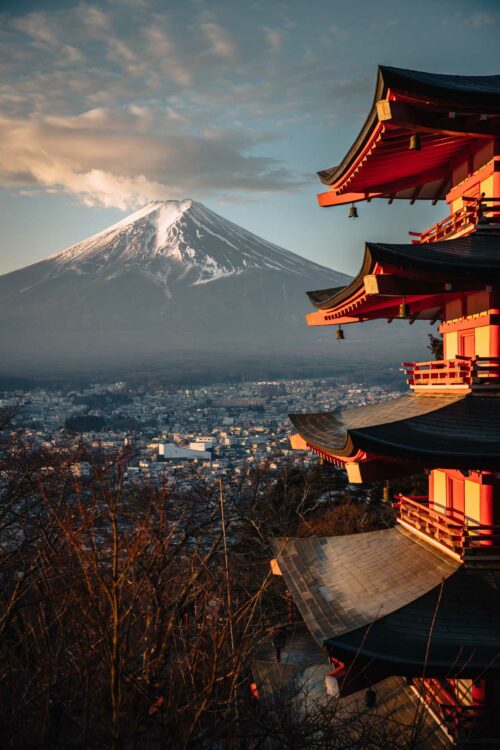
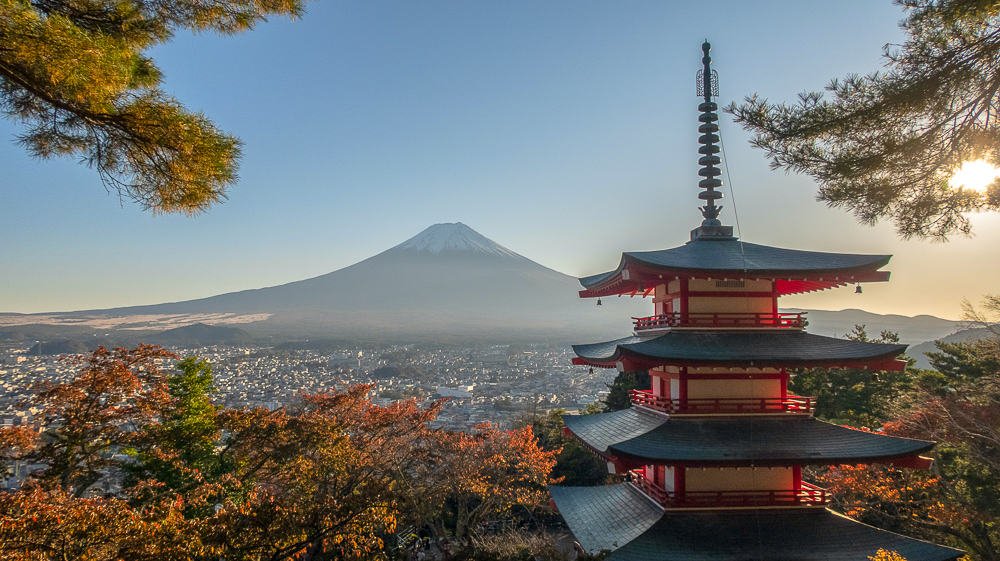
HOW TO GET FROM MOUNT FUJI TO TOKYO
To get back to Tokyo, take the Fuji View Express back to Otsuki, then get on the local line bound for Takao.
From there, you can pick up your bags, and get on a rapid service bound for Shinjuku, which takes around 40-50 minutes.
Alternatively, you can get a bus from Kawaguchiko station (4 stops from Shimoyoshida station on the Fuji View line) directly to Shinjuku.
However, I recommend getting the most out of your last few hours with your JR Rail Pass, and taking the trains!
If you have more time available, why not plan a Japan itinerary 7 days with Disneyland.
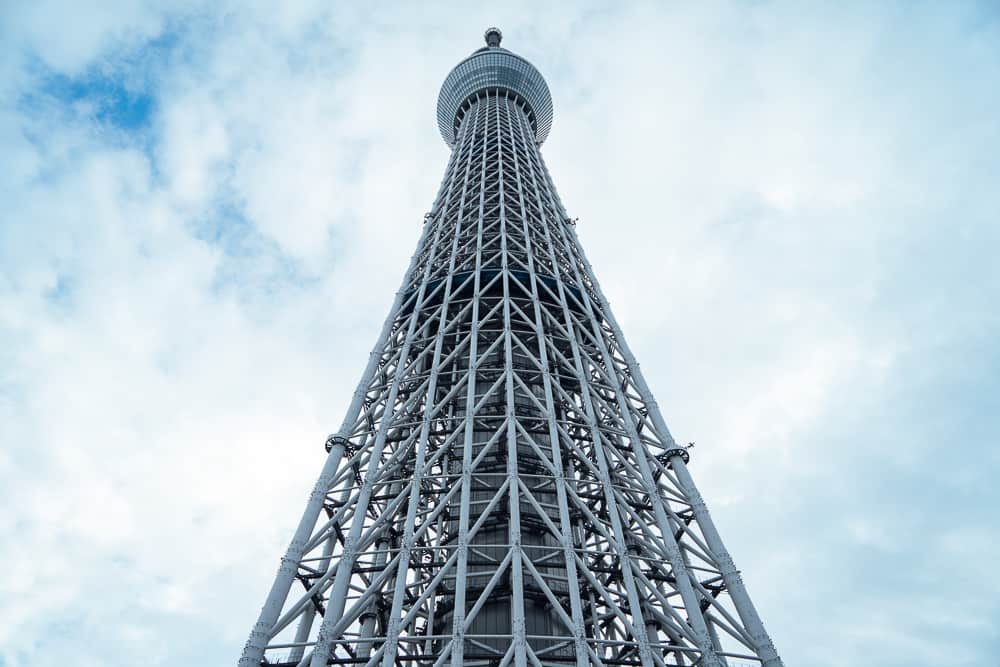
BEST TOURS IN TOKYO
WHERE TO STAY IN TOKYO
Tokyo has hundreds of accommodation options to choose from, so I have narrowed it down to a few of the best places to stay in Tokyo to suit the needs of luxury travelers, budget backpackers, and everyone in between.
See the list of accommodations below that I personally recommend in Tokyo for your Japan trip itinerary 7 days.
LUXURY: THE AOYAMA GRAND HOTEL
MID RANGE: AKASAKA EXCEL HOTEL
BUDGET: UNPLAN SHINJUKU
For More Options, See My Guide On The Best Places To Stay In Tokyo
THINGS TO KNOW BEFORE YOU GO
CURRENCY:
The currency in Japan is Yen (¥) and the exchange rate is approximately $1 USD = 149 ¥.
There are plenty of ATMs in Japan located in most convenient stores, in front of banks, inside hotels, etc. where you can easily withdraw cash to have with you during your 7 days in Japan.
That being said, you’ll want to get ready for the Japan itinerary 7 days budget and expenses, and getting a Wise card is an excellent option.
Need A Travel Money Card?
Wise offers multi-currency cards that can be used worldwide and you’ll save $ on transaction fees.
Get a Wise card today for FREE!
LANGUAGE:
Most Japanese people can speak English, so if you are ever lost or need help with something you will be able to converse in English.
Also, all the signs at the airports, train stations, and shopping malls are written in both Japanese and English.
SIM CARD:
Before preparing. an itinerary Japan 7 days, I recommend purchasing an eSIM so you have access to the internet throughout your trip.
Forget plastic SIM Cards… Get an eSIM!
Say hello to eSIM – a virtual SIM card pre-loaded with mobile data so you can get online and stay connected around the world.
OneSimCard is the best eSIM for travel, with low-cost data packages available in 150+ countries.
Simply buy online, install it on your smartphone, and you’re good to go!
BEST TIME TO VISIT JAPAN
The best time to visit Japan depends on what you plan to do.
I personally prefer the spring and summer months in Japan (April – September) when temperatures are warm and the landscapes are vividly green.
However, visiting Japan in winter (December – March) is absolutely magical because the landscapes are completely covered in glistening white snow.
Visiting Japan in winter also means you have to opportunity to go skiing and snowboarding in Japan’s alpine regions like Hakuba.
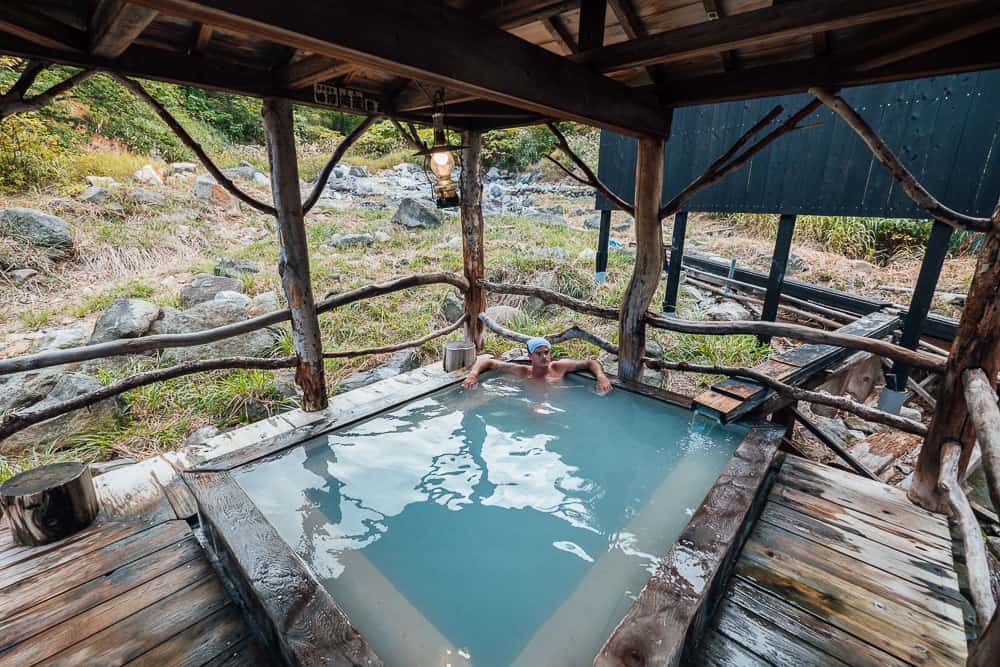
VISA FOR JAPAN
Japan is visa-free for travelers from over 65 countries, and you can stay in Japan for up to 90 days on a tourist visa. Plenty of time for a sample itinerary for Japan visa 2024.
Click Here to see the full list of nationalities that are eligible for the free 90-day tourist visa.
You don’t need to apply online for this as you will be granted a 90-day tourist visa at the airport when you arrive.

MAP OF JAPAN
Click here or on the image below for an interactive map of Japan.
WHAT TO PACK FOR JAPAN
When planning a 7 days itinerary Japan, here is a list of items I highly recommend bringing with you.
Must-Have Travel Essentials
Keep your cash and other valuables safe with this anti-theft hidden money wallet!
The GRAYL GeoPress is the best reusable bottle that allows you to purify water from anywhere!
FINAL THOUGHTS – JAPAN ITINERARY 7 DAYS
After seven eventful days of exploring Japan, this Japan 2024 itinerary by far exceeded my expectations!
With many fun activities to do and attractions to see, Japan is definitely worth adding to your bucket list. I guarantee you won’t regret it!
If you have any questions at all about this Japan 7 day itinerary, please leave me a comment below this post and I will get back to you as soon as I can.
For a quicker response, be sure to join Jonny Melon’s Travel Tribe on Facebook and post your questions or recommendations to our awesome community.

TRAVEL RESOURCES FOR YOUR NEXT TRIP
Whether you’re a seasoned traveler or it’s your first trip overseas, here are some useful travel resources to help you kick-start your next adventure!
THANKS FOR READING
Hey friend, thanks for reading this guide!
Please know this post may contain affiliate links. When making a purchase through one of my links, I earn a small kickback at no extra cost to you and it’s a big help to keep the site up and running. Rest assured, I only promote products and services that I personally use and recommend.
Click here to find out how you can support the site organically.
Many thanks!
PIN IT FOR LATER
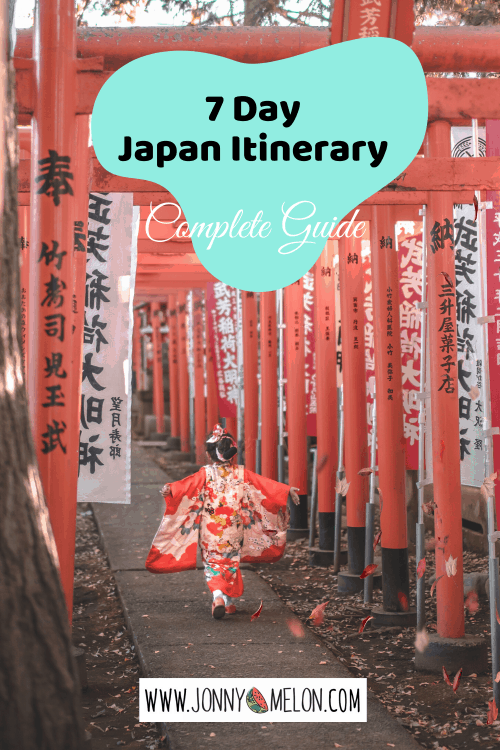
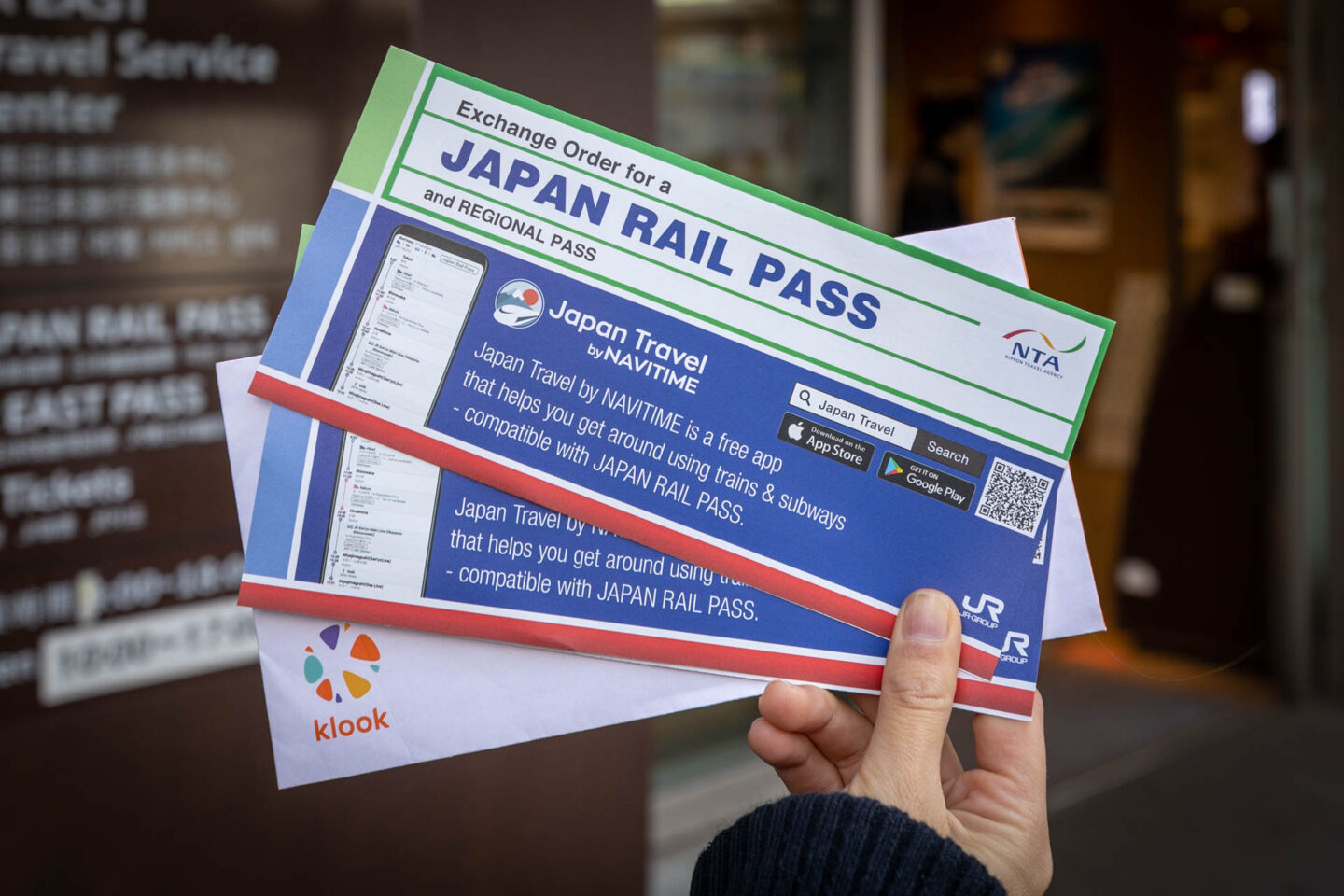
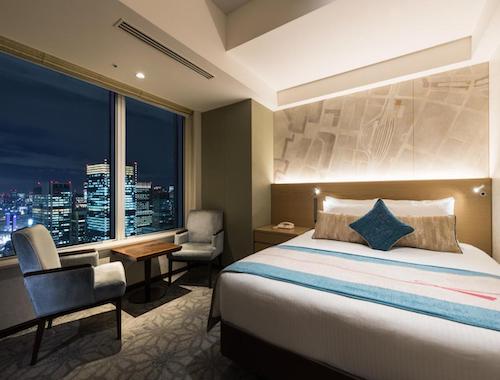
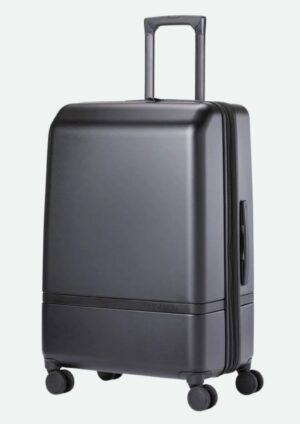
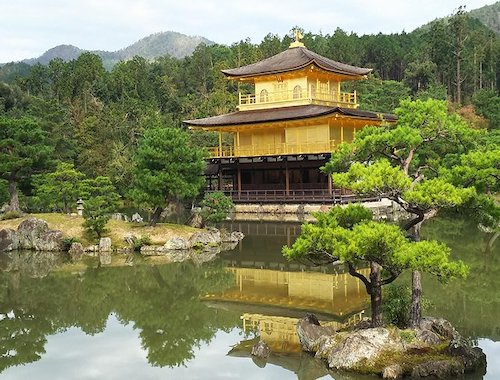



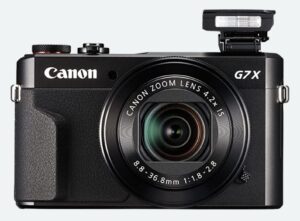






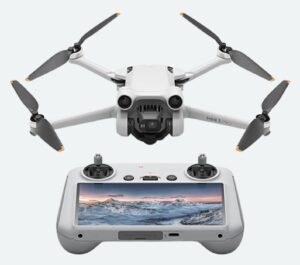
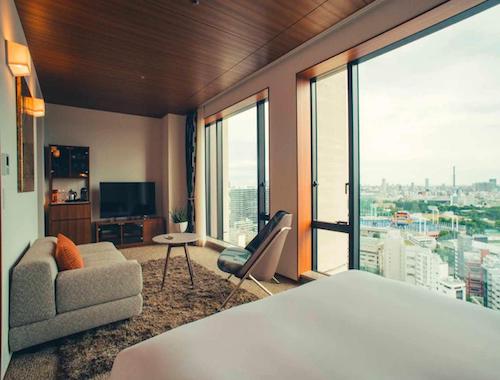



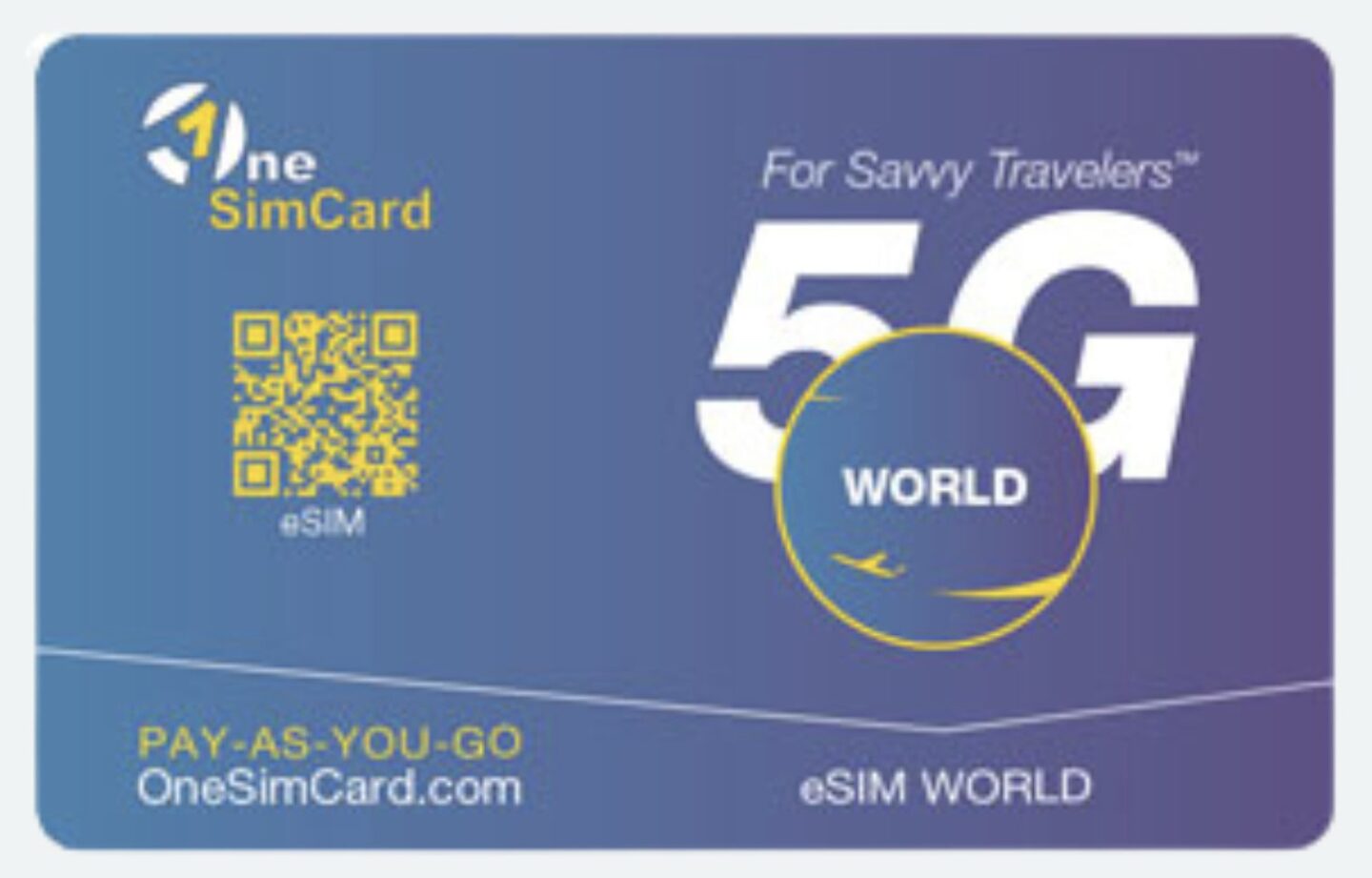
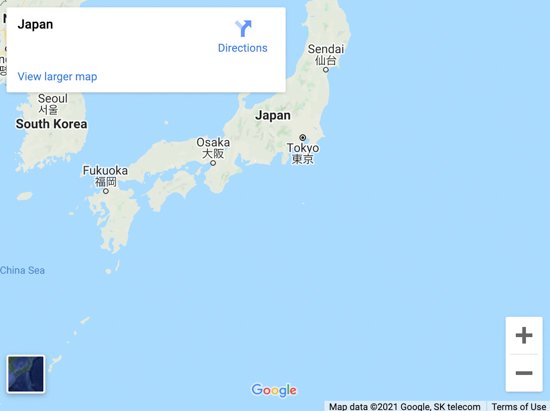

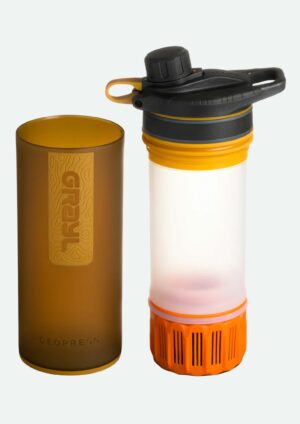
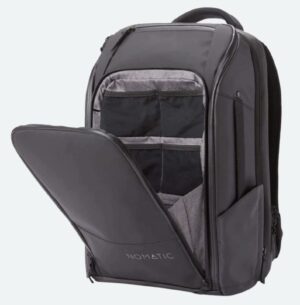
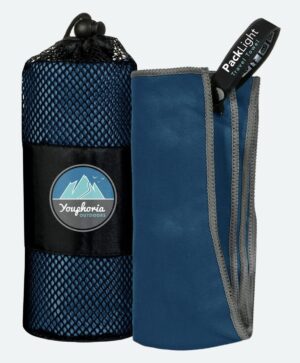
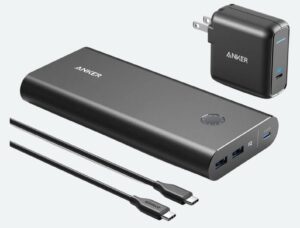
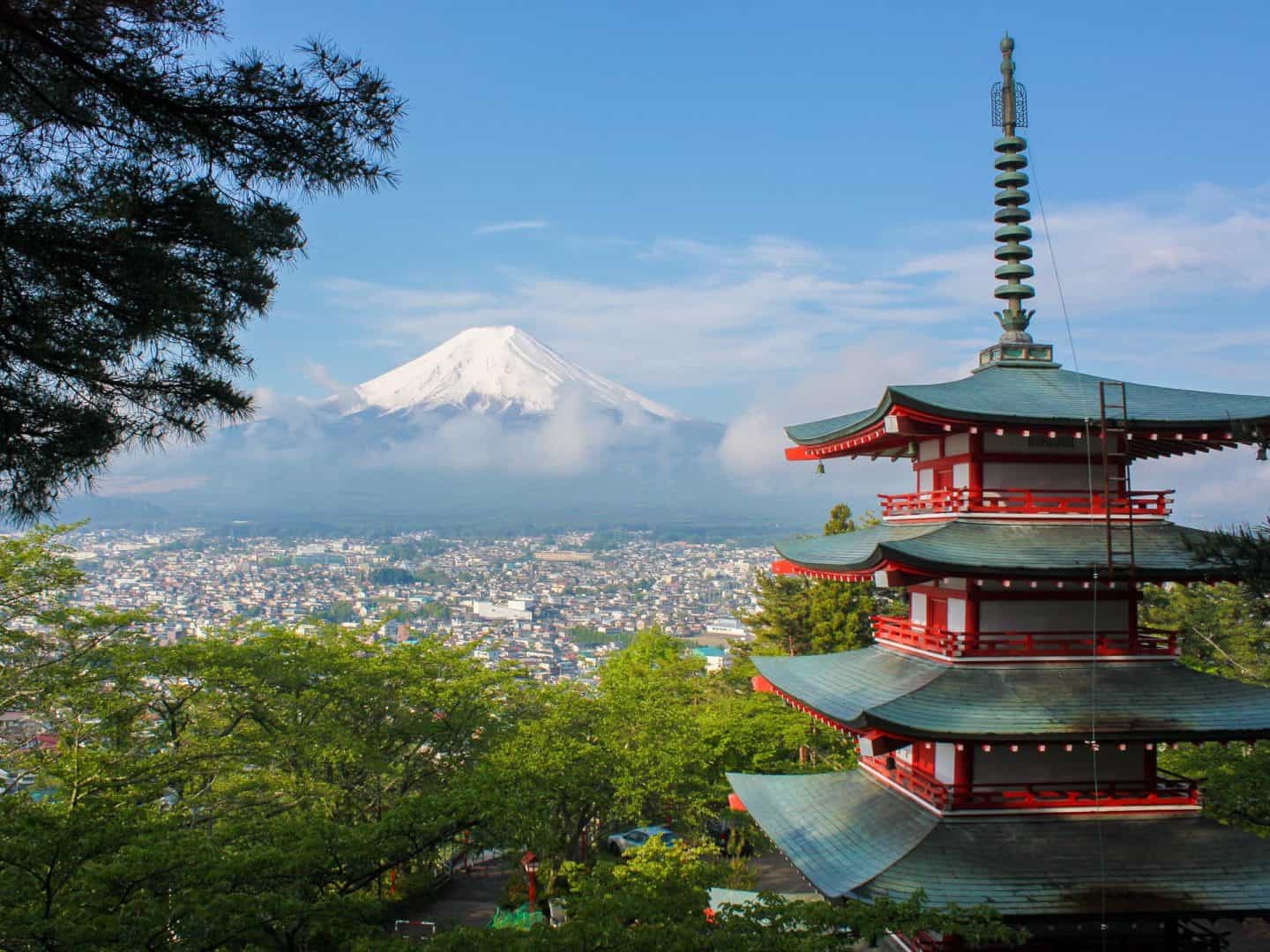


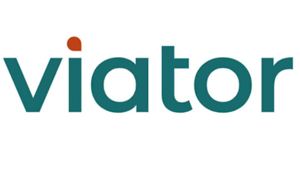



Hi Jonny,
Love this 7 day itinerary. Planning to visit Japan this August with my husband and two teens. I would love to follow your proposed itinerary but a bit confused where to stay. Is it advisable to stay only in Kyoto in this 7 day itinerary of yours or would you advise as to stay to other accommodation each day?
Thanks and Kind REgards,
Joan
Hi Joan, thanks for the positive feedback, glad you found my japan itinerary useful. I have suggested accommodations to stay in each location on this itinerary not just kyoto. you’ll find hotel recommendations in osaka, hiroshima, and tokyo. hope this helps and enjoy your trip!
Hey Jonny! I have two more questions:
1) I’m thinking about cutting out the activities on Day 4 so I can check out Kobe too! If I did this, how would you re-arrange the itinerary so it’s the most convenient for travel? Would you just insert Kobe to Day 4 or insert it the day before Hiroshima since it’s closer via location?
2) Also, would you spend a night in Kobe or just a day trip and sleep back in Osaka since it’s not far?
Much appreciated!
I would suggest stopping into Kobe on the way down to Hiroshima for a day trip, or half-day trip, makes more sense in terms of the location between Osaka and Hiroshima. Otherwise, yes, on day 4 you could skip activities and head to Kobe for the day, perhaps even stay the night, and then head to Hiroshima afterward. I hope that helps in some way!
Thanks again Melon! If you’re ever in South Korea hit me up and I can show you around. Gyeongju is known as the “culture capital”, it’s a beautiful place 🙂
A pleasure! South Korea is high on my list, I may take you up on that offer haha! Much appreciated and let me know if there’s anything else I can assist with for your Japan trip!
Sick! I should be here until March 2023, but who knows maybe I’ll stay for a 4th year too haha. Actually, yes, I did have something else:
1) On Day 3, since I’ll go to Nara, would you recommend staying the night instead of heading back to Kyoto? OR does that make the trip to Osaka the next day more difficult from Nara perhaps? OR is there not much to do in Nara at night maybe? What are your thoughts?
Cheers!
Hey Jonny!
Your itinerary looks amazing it’s a big help! I have a question. I’m living in South Korea. On Day 7, would it be best to go all the way back to Tokyo, or is it easier to fly back to South Korea from Fukuoka? On the map, it looks much closer, and there’s a railway all the way there too. What do you think is best??
Hey Marco, you’re most welcome, glad you found this 7 day Japan itinerary useful! It’s not necessary to go all the way back to Tokyo and you could instead depart from Fukuoka. Hope this helps and enjoy your trip!
Thanks again, it really is helpful to me. Your story sounds epic, you’ll inspire others to travel for sure! I decided to fly in and out of Osaka and cut out Tokyo altogether for simplicity. My friend recommended the Kansai Thru Pass instead of the JR Rail as a budget-friendly alternative since I’ll be in the Kansai region for the majority of the trip. I’ll use a few of your affiliate links too so you can get paid for your efforts 🙂 Respect!
Amazing mate, you’re welcome!! Many thanks for using the aff links, it all helps to keep me going!
Very helpful indeed! Help us a lot with a very detailed itinerary. Kudos!
Do you have the updated it Itinerary for 2023? We will be going this last week of April last week.
Very concerned with the pricing & places to stay.
Hey Paul, thanks for reading, and glad you found this japan itinerary useful! This is the most up to date itinerary for this year. Japan is generally an expensive country year-round and April is the high season because of the cherry blossoms season. Please let me know if there’s anything else I can help you with. Enjoy 🙂